ZenBusinessPlans
Home » Sample Business Plans » Education » School

How to Write a Music School Business Plan [Sample Template]
Are you about starting a music school? If YES, here is a complete sample music school business plan template & feasibility report you can use for FREE . Okay, so we have considered all the requirements for starting a music school. We also took it further by analyzing and drafting a sample small music school marketing plan template backed up by actionable guerrilla marketing ideas for music schools. So let’s proceed to the business planning section .
Why Start a Music School?
The music industry is notable for producing celebrities and “overnight” millionaires on a global scale, but one thing about this industry is that it appears that we have less number of music schools to carter for the growing number of people who choose music as a career. If you are music inclined, you should start thinking of ways to benefit from the booming music industry, and one of the ways you can benefit from this industry is by starting your own music school.
Depending on the picture you have in mind before considering starting your music school, you would require hard work, moderate capital and various training and certification before you can successfully establish your own music school.
If you intend issuing a certificate or diploma that would be recognized by the government, then you should apply for licensing and approval from the government agency responsible for regulating the education industry in your country.
But if your aim is just to run a music school where you will just train people to acquire the basic skills of playing any musical instrument of their choice, then you need not bother to go through the stress of applying for license; in fact, you can even start the music school in your house.
It is important to state that to be able to start a music school, you should have been trained and also you should be able to play couple of major musical instrument. As a matter of fact, in the bid of raising capital for your music school, you should first start with home tutors and then save up cash to rent a facility and buy all the required musical instruments.
Now that you have decided to start your own music school, it is important that you sit back to create plans on how to raise start – up capital, how to attract clients, how to generate profits and how to run the business. These are the questions your business plan will help you answer. Below is a sample music school business plan template that will help you successfully write yours with little or no stress.
A Sample Music School Business Plan Template
1. industry overview.
First and foremost, it is important to state that the music school line of business can safely be categorized under the Fine Arts Schools industry. Basically, players in the Fine Arts industry offer instruction in the arts, including art, dance, drama, music and photography.
Programs that offer academic degrees, even if they specialize in fine arts are not included in this industry. It is also important to state that commercial and graphic arts and commercial photography instruction, are not included in this industry but they are part of the Trade and Technical Schools industry
If you are part of the people keeping tabs on happenings in the Fine Arts Schools industry, you will agree that the industry has developed a creative edge over the last half a decade. It is glaring that revenue growth in the industry began to rebound as the economy started to recover and schools’ endowment funds and corporate profit bounced back.
In addition, still-high unemployment brought strong demand from a larger number of individuals who were out of work. In the next half a decade, the industry revenue is expected to further improve due to stronger investment returns from endowment funds and higher tuition revenue amongst other factors.
The Fine Arts Schools cum Music Schools industry is indeed a large industry and pretty much active in countries such as United States of America, United Kingdom, Germany, France, Italy, Holland, Switzerland, Australia and Canada et al.
Statistics has it that in the united states of America alone, there are about 13,470 registered and licensed (accredited) music schools scattered all across the United States responsible for employing about 91,328 people and the industry rakes in a whooping sum of $4 billion annually. The industry is projected to grow at 1.3 percent annual growth within 2011 and 2016. It is important to state that there is no establishment in this industry that has a lion market share.
A recent research conducted by IBISWORLD shows that Fine arts schools (music schools inclusive) usually enroll small numbers of students per class and serve local markets. This contributes to a low level of market concentration in the Fine Arts School industry. IBIS World estimates that the top four players account for less than 2.0 percent of industry revenue in 2016.
The report further stated that the industry is highly fragmented with a large number of small enterprises and nonprofit organizations; high concentration is not anticipated to change in the near future as additional schools open.
This is comparable with the education sector at large. In 2016, 80.0 percent of the establishments have fewer than 10 employees. In addition, lower student-to-teacher ratios are thought to facilitate better learning environments and provide more personal attention to students.
Over and above, any entrepreneur who is a certified music instructor can successfully launch his or her music school and make great gains from the industry simply because the industry is still growing and more people are becoming aware of the immense benefits they stand to gain when the enroll in a music school.
2. Executive Summary
Maestro Melody Music School®, LLC is a standard, licensed, accredited and well equipped music school with state of the art facility and space large enough to contain about 50 people per – time. We run a music school where kids, teens, and adults can learn how to play a wide range of musical instrument in a fun – fulfilled and relaxing atmosphere.
Our music school will be located in – between a well – populated residential estate and a business district in Palm Beach – Florida, United States of America. We hope to open branches of our music school in other key cities in the United States and Canada and also to sell franchise in the nearest future.
Maestro Melody Music School®, LLC is a client-focused and result driven music school that provides ease to learn and fully practice and experience at an affordable fee that won’t in any way put a hole in the pocket of our clients ( students and organizations alike who would hire our services ).
We will offer a standard and professional music instruments training in a highly secured and conducive learning environment to all our students. We will ensure that we work hard to meet and surpass all our students’ expectations as it relates to their goals of enrolling in our music school or engaging our services.
Our music school facility will be well – equipped with wood-sprung floors, a comfortable lobby with flat screen TVs, and a wide range of music instruments. We will also run a one – stop music store in same facility where our students and other customers can purchase authentic musical instruments and other related accessories.
At Maestro Melody Music School®, LLC, our students’ overall best interest would always come first, and everything we do is guided by our values and professional ethics. We will ensure that we hire professional and licensed musical instruments coaches, and instructors to work with our students.
Maestro Melody Music School®, LLC will at all times demonstrate her commitment to sustainability, both individually and as a dance related training organization, by actively participating in our communities and integrating sustainable business practices wherever possible.
We will ensure that we hold ourselves accountable to the highest standards by meeting our students’ needs precisely and completely. We will cultivate a working environment that provides a human, sustainable approach to earning a living, and living in our world, for our partners, employees and for our clients (students and corporate organization).
Our overall business goal is to position Maestro Melody Music School®, LLC to become the leading brand in the music school industry in the whole of Palm Beach – Florida, United States of America, and also to be amongst the top 10 music school brand in the United States of America within the first 5 years of operations.
This might look too tall a dream but we are optimistic that this will surely come to pass because we have done our market research and feasibility studies and we are enthusiastic and confident that Palm Beach – Florida is the right place to launch our music school.
Maestro Melody Music School®, LLC is founded by Duke Edwards and his immediate family members. Duke Edwards has a Degree in Music from New York School Arts and he can perfectly play over 7 musical instruments. Duke Edwards has well over 20 years of experience as a music instructor prior to starting Maestro Melody Music School®, LLC.
3. Our Products and Services
Maestro Melody Music School®, LLC is going to offer varieties of musical instruments trainings and related services within the scope of the music schools industry in the United States of America. Our intention of starting our music school is to help in individual and organizations learn music and how to play various musical instruments in a conducive and relaxing environment.
We are also in the music school industry to make profits and we will do all that is permitted by the law in the US to achieve our aim and business goal. Our service offerings are listed below;
- Providing instructions and training on music and how to play various musical instruments
- Merchandise sales (musical instruments, equipment and other accessories)
4. Our Mission and Vision Statement
- Our vision is to build a highly competitive and effective music school that will become the number one choice for both individuals and corporate organizations in Palm Beach – Florida and in other cities in the United States of America and Canada where we intend opening our branches or selling our franchise.
- Our mission is to provide affordable professional and highly effective music trainings and services to a wide range of clients that cuts across different divides. Our overall business goal is to position Maestro Melody Music School®, LLC to become one of the leading music school – brand in the industry in the whole of Palm Beach – Florida, and also to be amongst the top 10 music school brand in the United States of America and Canada within the first 5 years of fully running the business.
Our Business Structure
Our company’s structure is not entirely different from what is obtainable in the music school industry, as a matter of priority, we have decided to create a structure that will allow for easy growth for all our employees and also, we have created platforms that will enable us attract some of the best hands in the industry.
We are quite aware that the success of any business lies in the foundation on which the business is built on, which is why we have decided to build our music school on the right business foundation. We will ensure that we only hire people that are talented, qualified, honest, hardworking, customer centric and are ready to work to help us build a prosperous business that will benefit all the stake holders ( the owners, workforce, and customers ).
As a matter of fact, profit-sharing arrangement will be made available to all our senior management staff and it will be based on their performance for a period of five years or more depending how fast we meet our set target.
Maestro Melody Music School®, LLC is fully aware of the modus operandi in the music school industry, hence adequate provision and competitive packages has been prepared for independent sales agents. Our marketing department will be responsible for managing this aspect of our business structure.
Below is the business structure we will build Maestro Melody Music School®, LLC on;
- Principal Partner / Chief Executive Officer
School Administrator
Musical Instruments Instructors / Coaches
- Marketing and Sales Executives
Accountant / Bursar
- Client Service Executive / Front Desk Officer
5. Job Roles and Responsibilities
Principal Partner / Chief Executive Officer:
- Increases management’s effectiveness by recruiting, selecting, orienting, training, coaching, counseling, and disciplining managers; communicating values, strategies, and objectives; assigning accountabilities; planning, monitoring, and appraising job results; developing incentives; developing a climate for offering information and opinions; providing educational opportunities.
- Creates, communicates, and implements the organization’s vision, mission, and overall direction – i.e. leading the development and implementation of the overall organization’s strategy.
- Responsible for fixing prices and signing business deals
- Responsible for providing direction for the business
- Responsible for signing checks and documents on behalf of the company
- Evaluates the success of the organization
- Reports to the board
- Responsible for overseeing the smooth running of HR and administrative tasks for Maestro Melody Music School®, LLC
- Designs job descriptions with KPI to drive performance management for martial arts instructors / coaches
- Regularly hold meetings with key stakeholders (clients and member of the board) to review the effectiveness of the business Policies, Procedures and Processes
- Maintains office supplies by checking stocks; placing and expediting orders; evaluating new products.
- Ensures operation of musical instruments / equipment by completing preventive maintenance requirements; calling for repairs.
- Defines job positions for recruitment and managing interviewing process
- Carries out staff induction for new team members
- Responsible for training, evaluation and assessment of employees
- Responsible for arranging travel, meetings and appointments
- Updates job knowledge by participating in educational opportunities; reading professional publications; maintaining personal networks; participating in professional organizations.
- Oversees the smooth running of the daily activities of Maestro Melody Music School®, LLC.
- Responsible for providing instructions and training on music and how to play various musical instruments
- Handles merchandise sales (musical instruments, equipment and other accessories)
- Attends promotional events and competitions
- Attends to any other task as instructed by the management
Marketing and Sales Executive
- Identifies, prioritizes, and reaches out to new clients, and business opportunities et al
- Identifies development opportunities; follows up on development leads and contacts; participates in the structuring and financing of projects; assures the completion of projects.
- Writes winning proposal documents, negotiate fees and rates in line with organizations’ policy
- Responsible for handling business research, market surveys and feasibility studies for clients
- Responsible for supervising implementation, advocate for the customer’s needs, and communicate with clients
- Develops, executes and evaluates new plans for expanding increase sales
- Documents all customer contact and information
- Represents Maestro Melody Music School®, LLC in strategic meetings
- Helps to increase sales and growth for Maestro Melody Music School®, LLC.
- Responsible for preparing financial reports, budgets, and financial statements for the organization
- Provides managements with financial analyses, development budgets, and accounting reports; analyzes financial feasibility for the most complex proposed projects; conducts market research to forecast trends and business conditions.
- Responsible for financial forecasting and risks analysis.
- Performs cash management, general ledger accounting, and financial reporting for one or more properties.
- Responsible for developing and managing financial systems and policies
- Responsible for administering payrolls
- Ensures compliance with taxation legislation
- Handles all financial transactions for Maestro Melody Music School®, LLC
- Serves as internal auditor for Maestro Melody Music School®, LLC.
Front Desk / Customer’s Service Officer
- Receives Visitors / clients on behalf of the organization
- Receives parcels / documents for the company
- Handles enquiries via e-mail and phone calls for the organization
- Distributes mails in the organization
- Ensures that all contacts with clients (e-mail, walk-In center, SMS or phone) provides the client with a personalized customer service experience of the highest level
- Through interaction with clients on the phone, uses every opportunity to build client’s interest in the company’s products and services
- Manages administrative duties assigned by the line manager in an effective and timely manner
- Consistently stays abreast of any new information on the company’s promotional campaigns etc. to ensure accurate and helpful information is supplied to clients when they make enquiries
6. SWOT Analysis
Maestro Melody Music School®, LLC engaged the services of a core professional in the area of business consulting and structuring to assist our organization in building a well – structured music school that can favorably compete in the highly competitive music industry in the United States and the world at large.
Part of what the team of business consultant did was to work with the management of our organization in conducting a SWOT analysis for Maestro Melody Music School®, LLC. Here is a summary from the result of the SWOT analysis that was conducted on behalf of Maestro Melody Music School®, LLC;
Our core strength lies in the power of our team; our workforce. We have a team that is considered experts in the music school industry, a team with excellent qualifications and robust experience in professional musical instruments trainings and practices.
Aside from the synergy that exist in our carefully selected faculty members, our state of the art musical instruments and our strong online presence, Maestro Melody Music School®, LLC is well positioned in a community with the right demography and we know we will attract loads of individual and corporate clients from the first day we open our doors for business.
As a new music school in Palm Beach – Florida, it might take some time for our organization to break into the market and gain acceptance especially from top profile clients in the already saturated music school industry; that is perhaps our major weakness. Another weakness could be that we might not have the required capital to pump into publicity of our business the way we intend going about it.
- Opportunities:
No doubt, the opportunities in the music school industry is massive considering the number of individuals and corporate organizations who would want to learn music and how to play various musical instruments for various reasons. As a standard and well equipped music school that is centrally located, we are ready to take advantage of any opportunity that comes our way.
Every business faces a threat or challenge at any part of the life cycle of the business. These threats can be external or internal. This shows the importance of a business plan, because most threats or challenges are to be anticipated and plans put in place to cushion what effect they might bring to the business.
Some of the threats that we are likely going to face as a music school operating in the United States of America are unfavorable government policies that might affect business such as ours, the arrival of a competitor within our location of operations and global economic downturn which usually affects spending / purchasing power. There is hardly anything we can do as regards these threats other than to be optimistic that things will continue to work for our good.
7. MARKET ANALYSIS
- Market Trends
If you part of the people keeping tabs on the trends in the Fine Arts Schools industry, you will agree that the industry has developed a creative edge over the last half a decade. It is glaring that revenue growth in the industry began to rebound as the economy started to recover and schools’ endowment funds and corporate profit bounced back.
The Music Schools industry growth was hindered early in recent time as the recession set in and the economy slumped. On the other hand, as the economic recovery took hold, rising per capita disposable income drove consumers to increase spending on activities which including musical instruction, supporting revenue growth in the industry.
Going forward, the industry is expected to grow at an even faster rate. A robust economic recovery is expected to endow consumers with higher disposable income levels, enabling them to spend more money on musical instruments training, particularly costly private lessons. In addition, the popularity of music in the United States will continue to drive demand for the industry’s services.
Lastly, in the bid to maximizing profits, loads of music schools engage in home services; they go to the houses of their clients as against their clients coming to their music school. So also, it is trendy to find music schools as engage in the sales of musical instruments and other musical merchandize in other to generate more income for the business.
8. Our Target Market
The target market for a music school is broad and of course all encompassing. Maestro Melody Music School®, LLC is positioned to offer a wide range of musical instrument related trainings and practice to a wide range of clients ranging from kids to adults and to people who want to actively compete in musical competitions or who want to launch their musical career.
As a standard and well equipped music school, Maestro Melody Music School®, LLC offers a wide range of musical instruments trainings and practice hence we are well trained and equipped to services a wide range of clients (both individual clients and corporate clients alike).
We are coming into the music school industry with a business concept and company’s profile that will enable us work with the clients at different learning stages and different status. Below is a list of the clients that we have specifically design our music school for;
- Aspiring musicians
- Working Class Adults / Corporate Executives
- Sport Clubs
- Business People / Entrepreneurs
- Government Officials
- Celebrities
- Public Figures
- Sports Men and Women
- College Students
Our competitive advantage
No doubt, the music school industry is indeed a very prolific and highly competitive industry. Clients will only enroll in your music school or hire your services if they know that you can successfully help them learn and practice various musical instruments of their choice effectively.
We are quite aware that to be highly competitive in the music school industry means that you should be able to deliver consistent quality trainings, your students / clients should be able to experience remarkable difference and improvement and you should be able to meet the expectations of your clients at all times.
Maestro Melody Music School®, LLC might be a new music school in Palm Beach – Florida, but we have a team that are considered experts in the music school industry, a team with excellent qualifications and robust experience in professional musical instruments trainings and practices.
Lastly, our employees (musical instruments instructors and coaches) will be well taken care of, and their welfare package will be among the best within our category (startups music schools in the United States) in the industry. It will enable them to be more than willing to build the business with us and help deliver our set goals and achieve all our business aims and objectives.
9. SALES AND MARKETING STRATEGY
- Sources of Income
Maestro Melody Music School®, LLC is established with the aim of maximizing profits in the music school industry and we are going to go all the way to ensure that we do all it takes to attract both individual clients and corporate clients on a regular basis.
Maestro Melody Music School®, LLC will generate income by offering the following services;
10. Sales Forecast
One thing is certain; there would always be corporate organization and individual clients who would need the services of professionals when it comes to learning how to play various musical instruments. This is the major reason why the services of music schools i.e. musical instruments instructors will always be needed.
We are well positioned to take on the available market in the Music Schools industry and we are quite optimistic that we will meet our set target of generating enough income / profits from the first six month of operations and grow our music school and our clientele base beyond Palm Beach – Florida to other cities in the United States of America.
We have been able to critically examine the Music Schools industry – market and we have analyzed our chances in the industry and we have been able to come up with the following sales forecast. The sales projections are based on information gathered on the field and some assumptions that are peculiar to similar startups in Palm Beach – Florida.
Below are the sales projections for Maestro Melody Music School®, LLC, it is based on the location of our music school and of course the wide range of musical instruments training classes and related services that we will be offering;
- First Fiscal Year-: $150,000
- Second Fiscal Year-: $450,000
- Third Fiscal Year-: $850,000
N.B : This projection is done based on what is obtainable in the music school industry and with the assumption that there won’t be any major economic meltdown and there won’t be any major competitor offering same additional services as we do within same location. Please note that the above projection might be lower and at the same time it might be higher.
- Marketing Strategy and Sales strategy
We are mindful of the fact that there are stiffer competitions amongst music schools in the United States of America; hence we have been able to hire some of the best marketing experts to handle our sales and marketing.
Our sales and marketing team will be recruited based on their vast experience in the industry and they will be trained on a regular basis so as to be well equipped to meet their targets and the overall goal of Maestro Melody Music School®, LLC.
We will also ensure that our students become experts when it comes to playing various musical instruments; we want to build a standard and well – equipped music school brand that will leverage on word of mouth advertisement from satisfied clients (both individuals and corporate organizations).
Our goal is to grow Maestro Melody Music School®, LLC to become one of the top 10 music school brands in the United States of America and Canada which is why we have mapped out strategy that will help us take advantage of the available market and grow to become a major force to reckon with not only in Palm Beach – Florida, but also in other cities in the United States of America and Canada where we intend opening branches of music school.
Maestro Melody Music School®, LLC is set to make use of the following marketing and sales strategies to attract clients;
- Introduce our music school by sending introductory letters alongside our brochure to corporate organizations, schools, religious organizations, households and key stake holders in Palm Beach – Florida.
- Print out fliers and business cards and strategically drop them in offices, libraries, public facilities and train stations et al.
- Use friends and family to spread word about our music school
- Post information about our music school and the services we offer on bulletin boards in places like schools, libraries, and local coffee shops et al
- Placing a small or classified advertisement in the newspaper, or local publication about our music school and the services we offer
- Using referral networks such as agencies that will help match students and corporate clients with our music school
- Advertise our music school in relevant entertainment magazines, newspapers, TV stations, and radio station.
- Attend music concerts and related expos, seminars, and business fairs et al
- Engage direct marketing approach
- Encourage word of mouth marketing from loyal and satisfied students
11. Publicity and Advertising Strategy
We have been able to work with our branding and publicity consultants to help us map out publicity and advertising strategies that will help us walk our way into the heart of our target market. We are set to become the number one choice for both corporate clients and private students in the whole of Palm Beach – Florida which is why we have made provisions for effective publicity and advertisement of our music school.
Below are the platforms we intend to leverage on to promote and advertise Maestro Melody Music School®, LLC;
- Place adverts on both print (community based newspapers and magazines) and electronic media platforms
- Sponsor relevant community based events / programs
- Leverage on the internet and social media platforms like; Instagram, Facebook, Twitter, YouTube, Google + et al to promote our brand
- Install our Bill Boards on strategic locations all around Palm Beach – Florida
- Engage in road show from time to time in targeted neighborhoods
- Distribute our fliers and handbills in target areas
- Contact corporate organizations by calling them up and informing them of Maestro Melody Music School®, LLC and the services we offer
- List Maestro Melody Music School®, LLC on local directories / yellow pages
- Advertise our music school in our official website and employ strategies that will help us pull traffic to the site.
- Ensure that all our musical instrument instructors cum trainers and other staff members wear our branded shirts and all our vehicles are well branded with our corporate logo et al.
12. Our Pricing Strategy
Generally, for musical instruments training classes, both per hour billing and flat fees on a weekly, monthly basis and contract applies. As a result of this, Maestro Melody Music School®, LLC will charge our clients flat fees except for few occasions where there will be need for us to charge special clients on hourly basis mostly for special clients and home tutors.
At Maestro Melody Music School®, LLC we will keep our fees below the average market rate for all of our students by keeping our overhead low and by collecting payment in advance. In addition, we will also offer special discounted rates to all our individual clients at regular intervals.
We are aware that there are some clients that would need special assistance, we will offer flat rate for such services that will be tailored to take care of such clients’ needs.
- Payment Options
The payment policy adopted by Maestro Melody Music School®, LLC is all inclusive because we are quite aware that different customers prefer different payment options as it suits them but at the same time, we will ensure that we abide by the financial rules and regulation of the United States of America.
Here are the payment options that Maestro Melody Music School®, LLC will make available to her clients;
- Payment via bank transfer
- Payment with cash
- Payment via credit cards / Point of Sale Machines (POS Machines)
- Payment via online bank transfer
- Payment via check
- Payment via mobile money transfer
- Payment via bank draft
In view of the above, we have chosen banking platforms that will enable our client make payment for all our services without any stress on their part. Our bank account numbers will be made available on our website and promotional materials to clients who may want to deposit cash or make online transfer for our services.
13. Startup Expenditure (Budget)
In setting up a martial arts school, the amount or cost will depend on the approach and scale you want to undertake. If you intend to go big by renting a place, then you would need a higher amount of capital as you would need to ensure that your employees are well taken care of, and that your musical school environment is conducive enough for the students to learn and to effectively practice martial arts.
This means that the start-up can either be low or high depending on your goals, vision and aspirations for your business.
The materials and equipment that will be used are nearly the same cost everywhere, and any difference in prices would be minimal and can be overlooked. As for the detailed cost analysis for starting a music school; it might differ in other countries due to the value of their money.
However, this is what it would cost us to start a music school in the United of America;
- Business incorporating fees in the United States of America will cost – $750.
- The budget for Liability insurance, permits and license will cost – $3,500
- Acquiring a space or warehouse that will be converted into the music school cum studio and that can accommodate the number of students that will come to learn for at least 6 months (Re – Construction of the facility inclusive) will cost – $150,000.
- Equipping the music school cum studio (various musical instruments, studio floor, sound system, Flat Screen TVs, computers, printers, projectors, furniture, telephones, filing cabinets, and electronics) will cost – $100,000
- Launching an official Website will cost – $500
- Amount need to pay bills and staff members for at least 2 to 3 months – $70,000
- Additional Expenditure such as Business cards, Signage, Adverts and Promotions will cost – $5,000
Going by the report from the market research and feasibility studies conducted, we will need over four hundred and fifty thousand ( 450,000 ) U.S. dollars to successfully set – up a small scale but standard music school in the United States of America. Please note that the salaries of all our staff members for the first month is included in the expenditure.
Generating Funds / Startup Capital for Maestro Melody Music School®, LLC
Maestro Melody Music School®, LLC is a private registered business that will be owned by Duke Edwards and his immediate family members. They are the sole financial of the business which is why they decided to restrict the sourcing of the start – up capital for the business to just three major sources.
These are the areas we intend generating our start – up capital;
- Generate part of the start – up capital from personal savings and sale of his stocks
- Generate part of the start – up capital from friends and other extended family members
- Generate a larger chunk of the startup capital from the bank (loan facility).
N.B: We have been able to generate about $150,000 ( Personal savings $100,000 and soft loan from family members $50,000 ) and we are at the final stages of obtaining a loan facility of $300,000 from our bank. All the papers and document has been duly signed and submitted, the loan has been approved and any moment from now our account will be credited.
14. Sustainability and Expansion Strategy
The future of a business lies in the numbers of loyal customers that they have the capacity and competence of the employees, their investment strategy and the business structure. If all of these factors are missing from a business (company), then it won’t be too long before the business close shop.
One of our major goals of starting Maestro Melody Music School®, LLC is to build a business that will survive off its own cash flow without the need for injecting finance from external sources once the business is officially running.
We know that one of the ways of gaining approval and winning customers over is to equip our music school facility with state of the musical instruments and equipment and make our school environment welcoming and conducive enough for people to effectively learn how to play musical instruments.
We will also offer our musical training services a little lower that what is obtainable in the industry so as to generate enough revenue to run the business.
Maestro Melody Music School®, LLC will make sure that the right foundation, structures and processes are put in place to ensure that our staff welfare are well taken of. Our company’s corporate culture is designed to drive our business to greater heights and training and re – training of our workforce is at the top burner.
As a matter of fact, profit-sharing arrangement will be made available to all our management staff and it will be based on their performance for a period of three years or more. We know that if that is put in place, we will be able to successfully hire and retain the best hands we can get in the industry; they will be more committed to help us build the business of our dreams.
Check List / Milestone
- Business Name Availability Check: Completed
- Business Incorporation: Completed
- Opening of Corporate Bank Accounts various banks in the United States: Completed
- Opening Online Payment Platforms: Completed
- Application and Obtaining Tax Payer’s ID: In Progress
- Application for business license and permit: Completed
- Purchase of All form of Insurance for the Business: Completed
- Lease a standard facility for the music school / studios: Completed
- Conducting Feasibility Studies: Completed
- Generating part of the start – up capital from the founders: Completed
- Writing of Business Plan: Completed
- Drafting of Employee’s Handbook: Completed
- Drafting of Contract Documents: In Progress
- Design of Logo for the martial arts school: Completed
- Graphic Designs and Printing of Packaging Marketing / Promotional Materials: Completed
- Recruitment of employees: In Progress
- Purchase of the needed musical instruments, furniture, office equipment, electronic appliances and facility facelift: In progress
- Creating Official Website for the business: In Progress
- Creating Awareness for the music school in Palm Beach – Florida: In Progress
- Health and Safety and Fire Safety Arrangement: In Progress
- Establishing business relationship with vendors and key players in various industries: In Progress
More on School

10 Steps to Open a Thriving Music School Business: Experts Advice
Related blogs.
- Music School: Is it a Lucrative Business?
- From Music Passion to Profit: A Guide to Starting Your Own Music School
- 7 Must-Track KPI Metrics for Music Schools: Measure Your Success Today
Music is one of the most powerful things on earth. It has the ability to bring back memories, evoke emotions, and even connect people who would never have met otherwise. That’s why we see more and more people wanting to learn music or even open their own music schools. In fact, according to IBISWorld, the music schools industry has experienced steady growth over the past five years and is predicted to continue to grow in the coming years.
If you’re reading this, you’re probably one of those people who dreams of opening your own music school, but you’re not quite sure where to start. Well, you’ve come to the right place! Opening a music school can be a challenging and time-consuming process, but with the right steps in place, it can be a fulfilling endeavor.
We’ve put together a 10-step checklist to help guide you on your journey toward opening a successful music school. By following these steps, you’ll be well on your way to achieving your dream of owning a music school.
So without further ado, let’s dive into the 10 steps you need to take to launch your music school business.
- Step 1: Establish goals and objectives – Define your mission, vision, values, and goals for your music school.
- Step 2: Research competition and industry – Understand the landscape of your local music school industry and analyze your competitors to identify unique selling points.
- Step 3: Draft a business plan – Develop a comprehensive business plan with a clear roadmap for how your music school will operate and grow in the future.
- Step 4: Create a financial model – Plan your finances strategically by forecasting income, expenses, and profits for your music school business.
- Step 5: Obtain necessary permits & licenses – Ensure you have all the required legal documentation and licenses to operate a music school business in your locality.
- Step 6: Secure funding – Determine how you plan to finance your music school. You can use your savings, seek partnership, or obtain a business loan.
- Step 7: Develop marketing strategy – Create an outreach plan to let people know about your music school. Consider the appropriate channels such as social media and traditional media.
- Step 8: Design a curriculum – Develop a comprehensive curriculum that covers a range of instruments, genres, and levels of proficiency to attract a diverse clientele.
- Step 9: Hire staff – Build your team by hiring qualified music teachers, administrative, and support staff who align with your school's philosophy and goals.
- Step 10: Launch and operate – Launch your music school with a grand opening and start operating your school business while iterating and refining your approach.
Stay tuned for more elaboration and context on each step in our following blog posts.
1. Establish Goals And Objectives
Before starting a music school business, you need to have a clear understanding of what you want to achieve. Establishing goals and objectives will give you a direction to work towards and a roadmap to follow. Here are some considerations:
- Define your vision: This is the big picture of what you want to achieve with your music school. What do you envision the business to be like in 5, 10, or 20 years?
- Set specific goals: What are your short-term and long-term goals? What do you want to achieve in the next year, three years, and five years?
- Identify your target market: Who are you serving? What kind of students do you want to attract?
- Determine your unique selling point: What makes your music school stand out from the competition? What are the benefits of attending your school?
Tips & Tricks:
- Make sure your goals are specific, measurable, and attainable
- Write down your goals and review them regularly to stay on track
- Be flexible and willing to adjust your goals as circumstances change
| Music School Business Plan DOWNLOAD |
Research Competition And Industry
Before you start a music school business, it is important to analyze the competition you will face in the industry. This will help you understand the market and challenges ahead.
- Identify the competition: Research and analyze other music schools in your area. Find out what services they offer, their pricing, target audience, strengths, and weaknesses. You can also check online for music schools in your area.
- Understand industry trends: Stay up-to-date with the latest trends in the music industry. This will help you understand the needs of your target audience and adjust your services accordingly.
- Explore opportunities: Identify gaps in the market that your music school can fill. Look for unique ways to offer your services and differentiate yourself from competitors.
- Don't underestimate the competition - analyze them carefully to understand their strengths and weaknesses.
- Stay up-to-date with the latest industry trends - this will help you plan ahead and offer relevant services to your target audience.
- Be creative - find unique ways to differentiate your music school from competitors and fill gaps in the market.
Once you have researched the competition and industry, it's time to develop a business plan for your music school.
- Create a business plan: A business plan is essential for any business. It outlines your goals, target market, services, marketing strategies, financial projections, and more. This will help you stay organized and focused on your goals.
- Determine your target audience: Identify your ideal customer. Who are they? What age group do they belong to? What is their skill level? Understanding your target audience will help you create services that meet their needs and attract them to your music school.
- Define your services: Determine what services you want to offer at your music school. Will you offer individual or group lessons? What genres of music will you teach? Will you offer vocal lessons too?
- Develop a marketing strategy: Decide how you will market your music school to attract your target audience. Create a website, use social media, attend music fairs, offer promotions, and connect with local schools.
- Create a budget: Develop a detailed financial plan for your music school. This should include your expenses, startup costs, and projected revenue. Ensure that your expenses are covered while still offering competitive prices.
Finally, once your business plan is in place, it is time to take action. Follow through with the plan, monitor its progress, and make adjustments as necessary.
- Be flexible - adjust your plan as needed based on feedback from students and market conditions.
- Stay organized - use project management and financial tools to stay on top of expenses, revenue, and marketing campaigns.
- Communicate with your team - involve your staff in the planning process and ensure that everyone is on the same page.
3. Draft A Business Plan
A business plan is the blueprint or roadmap for establishing and running a successful business. In the case of a music school, it is a vital document that outlines the overall concept, financial projections, marketing strategies, and operational plan of the business. A well-thought-out business plan will not only help you secure funding but also provide clarity and direction for achieving your goals.
- Executive Summary: This section summarizes the entire business plan by highlighting the key elements such as the mission statement, market analysis, products and services, marketing and sales strategy, financial projections, and management team.
- Company Overview: This section provides an in-depth description of the music school, including the ownership structure, legal entity, location, facilities, and equipment.
- Market Analysis: This section identifies the target market, the demand for music lessons, and the competition in the area. It also includes a SWOT (Strength, Weaknesses, Opportunities, and Threats) analysis.
- Products and Services: This section outlines the music lessons offered by the school, the curriculum, the instructors, and the pricing strategy.
- Marketing and Sales Strategy: This section details how the music school will attract and retain students, reach out to potential customers, and promote its services.
- Financial Plan: This section includes financial projections for the first three to five years, including income statements, balance sheets, and cash flow statements. It also includes a break-even analysis and a discussion of funding sources.
- Management Team: This section profiles the owner(s) of the music school, their qualifications, and the roles and responsibilities of the management team.
- Operational Plan: This section outlines the day-to-day operations of the music school, including student enrollment, scheduling, staffing, and record-keeping.
Tips and Tricks:
- Start with a simple outline and gradually expand it into a detailed plan.
- Include realistic financial projections, taking into account all the expenses associated with running a music school.
- Review and update your business plan regularly to reflect changes in the market and the business environment.
In summary, a well-crafted business plan can help you navigate the complex world of entrepreneurship and increase your chances of success in the music school business. By following the steps outlined in this checklist, you can create a comprehensive plan that will set you on the path to creating a successful and sustainable business.
4. Create A Financial Model
Now that you have a solid understanding of what your music school business is all about, it's time to create a financial model. A financial model is a tool that helps you understand some vital metrics about your business's performance, such as revenue, expenses, cash flow, and profitability.
To create a financial model for your music school business, follow these steps:
- Identify your revenue streams: Determine the different ways that you can generate revenue in your music school business. This could include things like tuition fees, instrument rentals, merchandise sales, etc.
- Estimate your costs: Figure out all of your expected expenses, such as rent, instruments, staff salaries, marketing expenses, insurance, and others.
- Calculate your cash flow: Understand each of your cash inflows and outflows in different periods, determine when you expect to receive payments, and when you need to make payments to sustain your business's cash flow.
- Predict your profitability: Apply your income and expense data to your financial model to determine your business's operating profits and net profit.
Incorporate all of these elements together to create a solid financial model that helps you understand the financial performance of your business.
- Don't forget to project your revenue and expenses over multiple years, typically five years.
- Benchmark with industry organizations like Music Teachers National Association (MTNA), the International Association for Jazz Education (IAJE), and the National Association of Music Merchants (NAMM) to ensure that your estimates are feasible.
- Utilize financial models/templates available online if you're not confident with your spreadsheet skills.
5. Obtain Necessary Permits & Licenses
A successful music school business needs the proper permits and licenses to operate legally. To avoid legal issues and fines, you need to obtain the required permits and licenses before opening your business. Below are the essential permits and licenses that you might need to operate a music school business:
- Business License - A business license is required by all businesses before they can legally operate. The requirements for obtaining a business license vary depending on the location of your business.
- Music Licensing - If you plan to teach music, you may need a music license. This license gives you the right to use copyrighted music in your classes or performances. Ensure you acquire the music license from the relevant authorities.
- Fire Department Permits - Before you can open a music school, you need to get a fire department permit. The permit ensures that your school is fire-proof and meets all safety requirements.
- Zoning Permits - You'll need zoning permits to operate a music school business from your location. This permit ensures that your business meets local zoning laws and that the location of your business is suitable for a music school.
- Health Department Permit - If you plan to sell food or drinks at your music school, you may need a health department permit. This permit ensures that your facilities and food preparation meet all health codes requirements.
- Keep in mind that permit and license requirements vary based on location. Therefore, it's essential to confirm with the licensing agencies in your location to understand the specific permits and licenses you need.
- It's crucial to obtain all necessary permits and licenses before opening your business to avoid expensive penalties and legal issues.
- It's essential to be organized and keep track of the permits and licenses you have acquired to prevent expiry and non-compliance.
6. Secure Funding
Once you have determined your music school's location, niche, curriculum, and business plan, the next step is to secure funding. A music school business requires a considerable amount of money upfront, and it is crucial to have enough capital to start and run the business successfully. Here are ten ways to secure funding for your music school business:
- Start with your personal savings: It's always a good idea to invest your savings in your business. It gives you a sense of ownership and helps you to put your best foot forward without any financial stress.
- Attend industry events and conferences: Industry events can be a great place to find potential investors for your music school. Make sure to have a strong pitch and business plan to impress them.
- Offer equity to investors: Equity investment is a common way for startups to raise funds. It involves giving a percentage of ownership in your business in exchange for capital.
- Bank loans: Consider approaching banks for loans. However, be prepared to offer collateral and have a solid repayment plan.
- SBA loans: The Small Business Administration (SBA) offers loans to small businesses with competitive interest rates and long repayment terms.
- Crowdfunding: Crowdfunding platforms can be used to raise capital for your music school business. Launch a crowdfunding campaign and ask friends and family to invest in the business.
- Angel investors: Angel investors are affluent individuals who invest in startups for a percentage of ownership.
- Private investors: Private investors are another option for getting funding for your music school business.
- Grants: Look for grants aimed at helping small businesses in the arts industry.
- Sponsorship: Approach local businesses and corporations for sponsorship. They can sponsor your music school in exchange for advertising and branding opportunities.
- Personal loans: If you fail to obtain a loan from a bank, you can consider taking out personal loans.
To sum up, securing funding is an essential step in opening a music school business. Explore all the available options carefully and choose the one that works best for your business. Make sure to have a solid repayment plan in place and always be transparent with your investors to avoid any conflicts and misunderstandings in the future. Good luck!
7. Develop Marketing Strategy
Once you have your music school up and running, it's time to develop a marketing strategy to attract students and build your brand. Here are some key steps to help you develop an effective marketing strategy:
- Identify your target audience - Determine who your ideal student is and tailor your marketing efforts to reach this demographic.
- Create a unique selling proposition (USP) - Develop a clear message that sets your music school apart from competitors and highlights your unique strengths.
- Create a website and social media presence - Establish an online presence to showcase your services, testimonials, and any special offers or promotions.
- Offer referral incentives - Encourage your current students to recommend your music school to their friends and family by offering discounts or other incentives for successful referrals.
- Partner with local businesses - Build relationships with music stores, concert venues, and other businesses in your community to increase your visibility and reach.
- Attend local events - Set up a booth or attend local fairs and community events to reach potential students and promote your music school.
- Consider paid advertising - Depending on your budget, consider running targeted ads online or in local publications to reach a wider audience.
- Focus on word-of-mouth marketing - Satisfied students and parents can be your best ambassadors. Encourage them to leave positive reviews of your school on directories such as Google My Business, Yelp, or Facebook.
- Create engaging social media content - Share pictures, videos, and tips related to music education that will resonate with your target audience. Use hashtags and tags to increase your visibility and engagement.
- Offer a free trial lesson or consultation - Give prospective students a taste of what your music school has to offer by offering a free trial lesson or consultation. This can help build trust and lead to more conversions.
Remember that building a strong reputation and brand takes time and effort. Be consistent in your messaging and customer service, and always look for opportunities to improve and innovate.
8. Design A Curriculum
Designing a curriculum for your music school is a critical step towards establishing a successful business. A well-designed curriculum sets the foundation for the quality of education you will offer, which will ultimately help attract and retain students. Here are some chapters that will help guide you in designing a curriculum for your music school:
Chapter 1: Defining your goals and values
The first step in designing a curriculum is to define your goals and values. Take some time to reflect on the mission and vision of your music school. What are your objectives? What values guide your decision-making? What kind of educational experience do you want to provide to your students? These questions will help you establish the foundation for your curriculum.
Chapter 2: Identifying your target audience
Every music school has a unique target audience. Whether you're catering to young children or aspiring professionals, understanding your audience is crucial in developing a curriculum that meets their specific needs and interests. Take some time to analyze the demographics of your target audience, their musical backgrounds, and their preferences. This information will help you create a curriculum that is tailored to their needs.
Chapter 3: Planning your curriculum
Once you have a clear understanding of your goals, values, and target audience, you can begin planning your curriculum. At this stage, you should consider the following:
- The structure of your course offerings (e.g., individual lessons, group classes, ensembles)
- The content of your courses (e.g., music theory, history, technique)
- The level of difficulty of your courses (e.g., beginner, intermediate, advanced)
- The length and frequency of your classes
Chapter 4: Developing course materials and resources
Once you have a plan for your curriculum, you can start developing course materials and resources. This may include creating lesson plans, selecting textbooks and instructional materials, and developing practice exercises and assignments. Make sure that all of your course materials align with the goals and values you established earlier.
Chapter 5: Hiring teachers
A talented and experienced teaching staff is crucial for the success of your music school. When hiring teachers, make sure that they share your values and teaching philosophy. Consider their qualifications, experience, and teaching style. You may also want to involve them in the curriculum development process.
Tips & Tricks
- Keep your curriculum flexible to allow for changes and adjustments as necessary.
- Include opportunities for performance and collaboration within your curriculum.
- Get feedback from your students and teachers regularly to improve your curriculum.
Designing a curriculum is a crucial step towards opening a successful music school. With these chapters as a guide, you'll be well on your way to creating an educational experience that meets the needs of your students and aligns with your values and objectives.
9. Hire Staff
Having a competent and reliable team is crucial for the success of any business, especially a music school. The following are some steps to consider when hiring staff for your music school:
- Define the roles and responsibilities of each position: Before hiring staff, it's essential to have a clear understanding of what each position entails. Determine the key responsibilities and required qualifications for each role.
- Post the job listings: You can post job vacancies on popular job boards, music-related websites, or social media platforms. Be sure to include a job description and desired qualifications.
- Review applicant resumes and cover letters: Filter through candidate applications and select those who have the right qualifications and experience. Reach out to them for a phone interview.
- Conduct in-person or virtual interviews: Schedule interviews with the selected candidates to determine if they will be a good fit for your music school. Ask relevant questions to assess their skills, experience, and attitude.
- Check references: Before making a job offer, check the candidate's references to ensure their credibility and work ethic.
- Make a job offer: Once you've found the right candidate, make a job offer in writing. Include the job description, compensation package, and expected start date.
- Train staff: Provide your new staff with comprehensive training and orientation to ensure they are aware of your music school's operations, policies, and procedures.
- Offer competitive salary and benefits to hire and retain the best talent.
- Look for staff members who are passionate about music and education.
- Consider hiring musicians who can also teach at your school to save money on additional instructors.
By following these steps, you'll be able to hire qualified and competent staff for your music school. Remember to create a welcoming and inclusive environment for your employees to motivate them to provide quality education.
10. Launch And Operate
After completing all the nine steps stated in the previous chapters, you are now ready to launch your music school business. Here are the essential things to know and do while launching and operating your music school business.
- Create a launch plan: A launch plan will help you map out a clear strategy for launching your music school business and engaging potential customers. You may want to consider having a launch event to attract a wider customer base.
- Get all the required licenses and permits: Before opening a music school business, you need to ensure that you have all the necessary licenses and permits. This varies with different states, so check with your local business registration office for the requirements.
- Develop a marketing and advertising plan: It's essential to promote your music school business to attract potential students and customers. You may consider creating brochures, setting up social media pages, or partnering with other music-related businesses to promote your music school business.
- Put your systems in order: You will need to develop and implement clear policies and processes within your music school business. This includes creating student enrollment processes, fee payment schedules, and class schedules.
- Hire and train employees: You need to hire skilled and experienced music teachers who can teach various music instruments and genres. Ensure that your employees are adequately trained to deliver high-quality music education to your students.
- Create a positive learning environment: Create a positive environment for learning and practicing music in your school. This can include having soundproof rooms, good lighting, comfortable seating arrangements, and a good sound system.
- Offer excellent customer service: An excellent customer service experience will attract more customers and retain existing ones. Always put your customers first by promptly responding to their needs and addressing any complaints they may have.
- Continuously assess and improve your music school business: It's essential to continuously assess and improve your music school business to keep up with the changing needs of your customers. This could involve introducing new music programs, courses, or services that will enhance your music school business.
- Have a disaster recovery plan: Mishaps happen. It's important to have a contingency plan in case of emergencies such as building fires, break-ins, or natural disasters. Always have a disaster recovery plan in place to quickly and effectively respond to any emergencies.
- Monitor your finances: It's important to regularly monitor your finances to ensure that your music school business is meeting its financial goals. You may want to hire an accountant to help track your finances and create an efficient budgetary system.
Tips & Tricks for Running a Successful Music School Business
- Offer scholarships: Offering scholarships to talented students can improve your music school business's reputation and attract more customers.
- Create a referral program: By creating a referral program, you can incentivize existing students to refer their friends and family to your music school business, helping to grow your customer base.
- Partner with complementary businesses: Partnering with complementary businesses like music recording studios or instrument rental shops can help grow your customer base and increase revenue.
Now that you have an idea of what it takes to launch and operate your music school business successfully, it's time to put these steps into action. Starting and running a music school business can be challenging, but with the right approach and mindset, you can establish a successful business in the music industry.
Congratulations! You have reached the end of our 10-step checklist for opening a successful music school business. By following these steps, you have set yourself up for a strong foundation in the industry, and we wish you the best of luck on your journey.
Remember, the music school industry has experienced steady growth in recent years and is expected to continue to grow. According to IBISWorld, the industry brings in $2 billion annually. However, it's important to note that starting a music school business is not easy. It takes dedication, hard work, and patience to see it through.
With that being said, we hope that our guide has provided you with valuable insights and actionable steps to take as you embark on your journey. Make sure to check out our upcoming blog posts where we will elaborate on each step in more detail. And always remember, when it comes to music, the possibilities are endless!
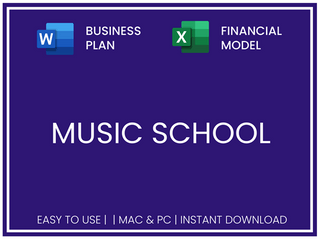
5-Year Excel
MAC & PC Compatible
Immediate Download
Related Articles
The surprising truth about profitability in the appliance store industry: a deep dive into the numbers, why investing in an alcohol treatment center is more profitable than you think, counting the profits: a closer look at the profitability of accounting agencies, the art of boosting profits in your a la carte restaurant: a comprehensive guide, airbnb: unpacking the profitability of one of the world's most successful companies., the untold story of how car washes are making a fortune: discover the profit potential today, pedaling to profit: unveiling the lucrative world of bicycle couriers, thirsty for success discover the untapped profit potential of running a beer bar, the beauty within profits: discovering the lucrative world of beauty salons, unlocking the profit potential: how to make your beach hotel more profitable, leave a comment.
Your email address will not be published. Required fields are marked *
Please note, comments must be approved before they are published
- Sample Business Plans
- Education & Training
Music School Business Plan

The rising culture of learning music has opened innumerable opportunities for music businesses. Music schools offer mind-boggling profit margins making it a lucrative business venture.
Anyone with a passion for music can start a music school. However, having a comprehensive business plan in action will help you secure the initial funds to get started.
Need help writing a business plan for your music school? You’re at the right place. Our music school business plan template will help you get started.

Free Business Plan Template
Download our free music school business plan template now and pave the way to success. Let’s turn your vision into an actionable strategy!
- Fill in the blanks – Outline
- Financial Tables
How to Write A Music School Business Plan?
Writing a music school business plan is a crucial step toward the success of your business. Here are the key steps to consider when writing a business plan:
1. Executive Summary
An executive summary is the first section planned to offer an overview of the entire business plan. However, it is written after the entire business plan is ready and summarizes each section of your plan.
Here are a few key components to include in your executive summary:
- Introduce your Business: Start your executive summary by briefly introducing your business to your readers.
- This section may include the name of your music school, its location, when it was founded, the type of music school (E.g., vocal training school, instrument learning school, early childhood music school, online music schools), etc.
- Market Opportunity: Summarize your market research, including market size, growth potential, and marketing trends. Highlight the opportunities in the market and how your business will fit in to fill the gap.
- Products and Services: Highlight the music school services you offer your clients. The USPs and differentiators you offer are always a plus.
- For instance, you may include music lessons, recitals, performances, and workshops as music services and mention individual instruction, personal attention, and niche expertise as some of your USPs.
- Marketing & Sales Strategies: Outline your sales and marketing strategies—what marketing platforms you use, how you plan on acquiring customers, etc.
- Financial Highlights: Briefly summarize your financial projections for the initial years of business operations. Include any capital or investment requirements, associated startup costs, projected revenues, and profit forecasts.
- Call to Action: Summarize your executive summary section with a clear CTA, for example, inviting angel investors to discuss the potential business investment.
Ensure your executive summary is clear, concise, easy to understand, and jargon-free.
Say goodbye to boring templates
Build your business plan faster and easier with AI
Plans starting from $7/month

2. Business Overview
The business overview section of your business plan offers detailed information about your company. The details you add will depend on how important they are to your business. Yet, business name, location, business history, and future goals are some of the foundational elements you must consider adding to this section:
- Business Description: Describe your business in this section by providing all the basic information:
- Vocal training school
- Instrument learning school
- Early childhood music school
- Online music schools
- Describe the legal structure of your music school, whether it is a sole proprietorship, LLC, partnership, or others.
- Explain where your business is located and why you selected the place.
- Owners: List the names of your music school’s founders or owners. Describe what shares they own and their responsibilities for efficiently managing the business.
- Mission Statement: Summarize your business’ objective, core principles, and values in your mission statement. This statement needs to be memorable, clear, and brief.
- Business History: If you’re an established music service provider, briefly describe your business history, like—when it was founded, how it evolved over time, etc.
- Additionally, If you have received any awards or recognition for excellent work, describe them.
- Future Goals: It’s crucial to convey your aspirations and vision. Mention your short-term and long-term goals; they can be specific targets for revenue, market share, or expanding your services.
This section should provide a thorough understanding of your business, its history, and its future plans. Keep this section engaging, precise, and to the point.
3. Market Analysis
The market analysis section of your business plan should offer a thorough understanding of the industry with the target market, competitors, and growth opportunities. You should include the following components in this section.
- Target market: Start this section by describing your target market. Define your ideal customer and explain what types of services they prefer. Creating a buyer persona will help you easily define your target market to your readers.
- For instance, children, teenagers, and adolescents would be an ideal target audience for online kids’ music school.
- Market size and growth potential: Describe your market size and growth potential and whether you will target a niche or a much broader market.
- For instance, the global kids’ music learning app is expected to reach 584.90 million dollars by 2030. It’s important to determine your share of the target market from this and its potential growth.
- Competitive Analysis: Identify and analyze your direct and indirect competitors. Identify their strengths and weaknesses, and describe what differentiates your music school services from them. Point out how you have a competitive edge in the market.
- Market Trends: Analyze emerging trends in the industry, such as technology disruptions, changes in customer behavior or preferences, etc. Explain how your business will cope with all the trends.
- For instance, web-based music learning has a booming market; explain how you plan on dealing with this potential growth opportunity.
- Regulatory Environment: List regulations and licensing requirements that may affect your music school, such as business registration, online regulations, insurance, environmental regulations, state and federal regulations, etc.
Here are a few tips for writing the market analysis section of your music school business plan:
- Conduct market research, industry reports, and surveys to gather data.
- Provide specific and detailed information whenever possible.
- Illustrate your points with charts and graphs.
- Write your business plan keeping your target audience in mind.
4. Music Services and instrument
The product and services section should describe the specific services and products that will be offered to customers. To write this section should include the following:
- Music lessons: Mention the different types of music lessons you will offer. This may include individual and group lessons for various instruments such as violin, guitar, piano, and vocal training.
- Quality measures: This section should explain how you maintain quality standards and consistently provide the highest quality service.
- This may include having qualified and experienced instructors, well-maintained facilities and equipment, and individual attention.
- Additional Services: Mention if your music school offers any additional services. You may include services like music summer camps, recording and production services, intensive workshops, etc.
In short, this section of your music school plan must be informative, precise, and client-focused. By providing a clear and compelling description of your offerings, you can help potential investors and readers understand the value of your business.
5. Sales And Marketing Strategies
Writing the sales and marketing strategies section means a list of strategies you will use to attract and retain your clients. Here are some key elements to include in your sales & marketing plan:
- Unique Selling Proposition (USP): Define your business’s USPs depending on the market you serve, the equipment you use, and the unique services you provide. Identifying USPs will help you plan your marketing strategies.
- For example, specialization in a certain niche(i.e. Guitar), experienced instructors, and music technology could be some of the great USPs for an instrument music learning school.
- Pricing Strategy: Describe your pricing strategy—how you plan to price your music services and stay competitive in the local market. You can mention any initial discounts you plan on offering to attract new customers to your music service.
- Marketing Strategies: Discuss your marketing strategies to market your services. You may include some of these marketing strategies in your business plan—social media marketing, Google ads, brochures, email marketing, content marketing, and print marketing.
- Sales Strategies: Outline the strategies you’ll implement to maximize your sales. Your sales strategies may include consultative sales, partnering with educational institutes, offering referral programs, etc.
- Customer Retention: Describe your customer retention strategies and how you plan to execute them. For instance, introducing loyalty programs, discounts on course subscriptions, personalized service, etc.
Overall, this section of your music school business plan should focus on customer acquisition and retention.
Have a specific, realistic, and data-driven approach while planning sales and marketing strategies for your music school, and be prepared to adapt or make strategic changes in your strategies based on feedback and results.
6. Operations Plan
The operations plan section of your business plan should outline the processes and procedures involved in your business operations, such as staffing requirements and operational processes. Here are a few components to add to your operations plan:
- Staffing & Training: Mention your music business’s staffing requirements, including the number of music instructors, accompanists, and support staff needed. Include their qualifications, the training required, and the duties they will perform.
- Operational Process: Outline the processes and procedures you will use to run your music school. Your operational processes may include scheduling classes, curriculum design, attending walk-ins, offering free trials, equipment maintenance, and staff training.
- Equipment & Machinery: Include the list of equipment and machinery required for a music school, such as musical and practice instruments, speakers, amplifiers, recording equipment, audio-visual tools, etc.
- Explain how these technologies help you maintain quality standards and improve the efficiency of your business operations.
Adding these components to your operations plan will help you lay out your business operations, which will eventually help you manage your business effectively.
7. Management Team
The management team section provides an overview of your music school management team. This section should provide a detailed description of each manager’s experience and qualifications, as well as their responsibilities and roles.
- Founders/CEO: Mention the founders and CEO of your music school, and describe their roles and responsibilities in successfully running the business.
- Key managers: Introduce your management and key members of your team, and explain their roles and responsibilities.
- It should include, key executives(e.g. director) senior management, and other department managers (e.g. head coach, instrument manager.) involved in the music school operations, including their education, professional background, and any relevant experience in the music industry. Organizational structure: Explain the organizational structure of your management team. Include the reporting line and decision-making hierarchy.
- Compensation Plan: Describe your compensation plan for the management and staff. Include their salaries, incentives, and other benefits.
- Advisors/Consultants: Mentioning advisors or consultants in your business plans adds credibility to your business idea.
- So, if you have any advisors or consultants, include them with their names and brief information consisting of roles and years of experience.
This section should describe the key personnel for your music services, highlighting how you have the perfect team to succeed.
8. Financial Plan
Your financial plan section should provide a summary of your business’s financial projections for the first few years. Here are some key elements to include in your financial plan:
- Profit & loss statement: Describe details such as projected revenue, operational costs, and service costs in your projected profit and loss statement . Make sure to include your business’s expected net profit or loss.
- Cash flow statement: The cash flow for the first few years of your operation should be estimated and described in this section. This may include billing invoices, payment receipts, loan payments, and any other cash flow statements.
- Balance Sheet: Create a projected balance sheet documenting your music school’s assets, liabilities, and equity.
- Break-even point: Determine and mention your business’s break-even point—the point at which your business costs and revenue will be equal.
- This exercise will help you understand how much revenue you need to generate to sustain or be profitable.
- Financing Needs: Calculate costs associated with starting a music school, and estimate your financing needs and how much capital you need to raise to operate your business. Be specific about your short-term and long-term financing requirements, such as investment capital or loans.
Be realistic with your financial projections, and make sure you offer relevant information and evidence to support your estimates.
9. Appendix
The appendix section of your plan should include any additional information supporting your business plan’s main content, such as market research, legal documentation, financial statements, and other relevant information.
- Add a table of contents for the appendix section to help readers easily find specific information or sections.
- In addition to your financial statements, provide additional financial documents like tax returns, a list of assets within the business, credit history, and more. These statements must be the latest and offer financial projections for at least the first three or five years of business operations.
- Provide data derived from market research, including stats about the music school industry, user demographics, and industry trends.
- Include any legal documents such as permits, licenses, and contracts.
- Include any additional documentation related to your business plan, such as product brochures, marketing materials, operational procedures, etc.
Use clear headings and labels for each section of the appendix so that readers can easily find the necessary information.
Remember, the appendix section of your music school business plan should only include relevant and important information supporting your plan’s main content.
The Quickest Way to turn a Business Idea into a Business Plan
Fill-in-the-blanks and automatic financials make it easy.
This sample music school business plan will provide an idea for writing a successful music school plan, including all the essential components of your business.
After this, if you still need clarification about writing an investment-ready business plan to impress your audience, download our music school business plan pdf .
Related Posts
DJ Business Plan
Music Festival Business Plan
Business Location Selection Process
AI-Enhanced Business Plan Tools
How to Make a Business Plan Presentation
Excellent Problem Statement Examples
Frequently asked questions, why do you need a music school business plan.
A business plan is an essential tool for anyone looking to start or run a successful music school. It helps to get clarity in your business, secures funding, and identifies potential challenges while starting and growing your business.
Overall, a well-written plan can help you make informed decisions, which can contribute to the long-term success of your music school.
How to get funding for your music school?
There are several ways to get funding for your music school, but self-funding is one of the most efficient and speedy funding options. Other options for funding are:
- Bank loan – You may apply for a loan in government or private banks.
- Small Business Administration (SBA) loan – SBA loans and schemes are available at affordable interest rates, so check the eligibility criteria before applying for it.
- Crowdfunding – The process of supporting a project or business by getting a lot of people to invest in your business, usually online.
- Angel investors – Getting funds from angel investors is one of the most sought startup options.
Apart from all these options, there are small business grants available, check for the same in your location and you can apply for it.
What is the easiest way to write your music school business plan?
A lot of research is necessary for writing a business plan, but you can write your plan most efficiently with the help of any music school business plan example and edit it as per your need. You can also quickly finish your plan in just a few hours or less with the help of our business plan software .
How detailed should the financial projections be in my music school business plan?
The level of detail of the financial projections of your music school may vary considering various business aspects like direct and indirect competition, pricing, and operational efficiency. However, your financial projections must be comprehensive enough to demonstrate a complete view of your financial performance.
Generally, the statements included in a business plan offer financial projections for at least the first three or five years of business operations.
Can a good music school business plan help me secure funding?
Indeed. A well-crafted music school business plan will help your investors better understand your business domain, market trends, strategies, business financials, and growth potential—helping them make better financial decisions.
So, if you have a profitable and investable business, a comprehensive business plan can certainly help you secure your business funding.
What's the importance of a marketing strategy in a music school business plan?
Marketing strategy is a key component of your music school business plan. Whether it is about achieving certain business goals or helping your investors understand your plan to maximize their return on investment—an impactful marketing strategy is the way to do it!
Here are a few pointers to help you understand the importance of having an impactful marketing strategy:
- It provides your business an edge over your competitors.
- It helps investors better understand your business and growth potential.
- It helps you develop products with the best profit potential.
- It helps you set accurate pricing for your products or services.
About the Author
Upmetrics Team
Upmetrics is the #1 business planning software that helps entrepreneurs and business owners create investment-ready business plans using AI. We regularly share business planning insights on our blog. Check out the Upmetrics blog for such interesting reads. Read more
Plan your business in the shortest time possible
No Risk – Cancel at Any Time – 15 Day Money Back Guarantee

Create a great Business Plan with great price.
- 400+ Business plan templates & examples
- AI Assistance & step by step guidance
- 4.8 Star rating on Trustpilot
Streamline your business planning process with Upmetrics .


How To Write a Business Plan for Music School in 9 Steps: Checklist
By alex ryzhkov, music school bundle.
| $169$99 | $59$39 | $39$29 | $15$9 | $25$15 | $15$9 | $15$9 | $15$9 | $19 |
Related Blogs
- Starting a Business
- KPI Metrics
- Running Expenses
- Startup Costs
- Pitch Deck Example
- Increasing Profitability
- Sales Strategy
- Rising Capital
- Valuing a Business
- How Much Makes
- Sell a Business
- Business Idea
- How To Avoid Mistakes
Are you passionate about music and want to share your love for it with others? Starting a music school could be the perfect business venture for you. According to recent statistics, the music education market has been experiencing steady growth, with an estimated worth of $8.9 billion in 2020 and a projected growth rate of 6.9% from 2021 to 2026 . With this demand for musical education on the rise, now is the perfect time to set up your own music school.
However, starting and running a successful music school requires careful planning and organization. In this blog post, we will guide you through 9 essential steps to help you write a comprehensive business plan for your music school. By following this checklist, you will ensure that you have covered all the necessary aspects of starting a music school and increase your chances of success.
Let's dive into the first step: conducting market research.
- Market research is a crucial step in understanding the demand for music education in your target market. It involves gathering information about potential customers, their preferences, and the overall market trends. This will help you identify any gaps or opportunities for your music school.
Conduct Market Research
Conducting thorough market research is an essential first step in creating a successful business plan for your music school. It allows you to gather valuable insights into the local music education industry and make informed decisions about your target audience, pricing, curriculum, and marketing strategies.
Here are some key points to consider when conducting market research for your music school:
- Identify the demand: Determine the level of interest and demand for music education in your target area. Research how many individuals, schools, and organizations are currently offering music lessons or workshops.
- Understand your target audience: Define the demographics and preferences of the students you aim to attract. Are you targeting children, teenagers, adults, or a combination of all? Do they prefer classical music, contemporary genres, or a mix?
- Analyze competitor offerings: Investigate other music schools or programs in your area. Evaluate their curriculum, pricing, teaching methods, and reputation. Identify gaps in their offerings that you can fill to differentiate your music school.
- Evaluate market trends: Stay up-to-date with current trends in music education and industry. Are there any emerging genres or instruments that are gaining popularity? Understanding these trends will help you shape your curriculum and ensure the relevance of your music school.
- Assess potential locations: Explore various locations where you can establish your music school. Consider the accessibility, competition, and foot traffic in those areas. A convenient, visible, and easily accessible location will likely attract more students.
Tips for conducting market research:
- Utilize online surveys, focus groups, and direct interviews to gather insights from potential students and their parents.
- Attend local musical events, concerts, and school functions to network with musicians, teachers, and parents in the community.
- Engage with local music stores, community centers, and schools to understand their perspective and potential partnerships.
- Investigate the demand for specialized music courses like music production or audio engineering to broaden your offerings.
By conducting thorough market research, you will gain a comprehensive understanding of the music education landscape in your area and be better equipped to create a business plan that meets the needs of your target audience.
| Music School Financial Model Get Template |
Define Your Target Audience
Defining your target audience is an essential step in developing a successful business plan for your music school. Identifying who your ideal customers are will help you tailor your marketing strategies and curriculum to meet their specific needs and desires.
To define your target audience, consider the following:
- Demographics: Gather information about the age range, gender, income level, and education level of your target audience. This data will help you customize your music classes to appeal to their preferences and abilities.
- Psychographics: Understand the interests, values, and motivations of your potential customers. Are they music enthusiasts looking to explore new instruments or styles? Are they parents seeking music lessons for their children? Knowing the psychographics of your target audience will guide your marketing messages and class offerings.
- Location: Identify the geographical area where your music school will operate. Consider the local market demand for music education and the availability of potential customers in that location.
- Competition: Research other music schools in your area to determine their target audience. Assess their strengths and weaknesses, and find a niche within the market that they may not be fully catering to. Differentiating yourself from the competition will help you attract your ideal customers.
Tips for Defining Your Target Audience:
- Conduct surveys or hold focus groups with potential customers to gather valuable insights about their interests and needs.
- Stay updated with market trends and changes in the music industry to ensure you are targeting the most relevant audience.
- Consider collaborating with local schools, community centers, or music stores to reach a wider audience and establish credibility.
By clearly defining your target audience, you can tailor your music school's offerings, marketing messages, and instructional approach to attract and retain the right customers. This will increase the chances of success and help your music school thrive in a competitive market.
Identify Your Competitors
When starting a music school, it is essential to have a clear understanding of who your competitors are in the market. Identifying your competitors allows you to assess the landscape and gain valuable insights that can shape your business strategy.
Research the local music education scene and identify other music schools or institutions offering similar services. Look for schools that cater to a similar target audience or focus on teaching specific musical instruments or styles.
Visit their websites and social media pages to understand their approach, pricing structure, and the unique features they emphasize. Take note of any innovative programs they offer or any specific strengths they possess. This information will help you gauge where your school fits in the market and how you can differentiate yourself.
Tips for identifying your competitors:
- Utilize local directories: Check online directories, such as business listings or music school directories, to discover potential competitors in your area.
- Attend music events: Visit concerts, recitals, or music festivals in your locality to identify music schools or instructors actively engaged in the community.
- Talk to musicians and parents: Engage with musicians and parents in your social circle or local music community to gather insights about existing music schools and their reputation among students.
- Monitor online forums: Participate in music-related online forums or Facebook groups to identify any discussions or recommendations related to local music schools.
Remember, identifying your competitors is not about imitating or replicating their offerings, but rather understanding how you can position your music school uniquely. By assessing your competitors, you can develop strategies to offer something different, innovative, or valuable to attract your target audience.
Determine Your Unique Selling Proposition
When starting a music school, it is essential to establish your unique selling proposition (USP). This is what sets your school apart from the competition and attracts potential customers. By identifying and emphasizing your school's unique qualities, you can differentiate yourself in the market and attract students who resonate with your offerings.
Here are some key points to consider when determining your unique selling proposition:
- Identify your school's strengths: Take stock of the qualities that make your music school stand out. This could include factors such as highly experienced instructors, specialized courses, state-of-the-art facilities, or a unique teaching methodology.
- Focus on your target audience: Understand the needs and preferences of your target audience. Are you catering to beginners, intermediate players, or aspiring professionals? Tailor your unique selling proposition to address their specific pain points and desires.
- Create a memorable brand: Develop a strong brand identity that reflects the essence of your music school. This includes your logo, website design, marketing materials, and overall messaging. Consistency and authenticity in branding will help you stand out in a crowded industry.
- Highlight your success stories: Showcase examples of students who have achieved remarkable progress or success through your music school. This can inspire potential students and demonstrate the efficacy of your teaching methods.
- Conduct a thorough analysis of your competitors to ensure your unique selling proposition is truly distinctive.
- Consider offering unique extracurricular activities or specialized workshops that complement your core music classes.
- Stay updated with the latest trends and advancements in music education to remain innovative and ensure your unique selling proposition remains relevant.
- Regularly revisit and refine your unique selling proposition to adapt to evolving market needs and maintain a competitive edge.
Assess The Feasibility Of Your Business Concept
Assessing the feasibility of your business concept is a crucial step in ensuring the success of your music school. This involves thoroughly evaluating the viability and potential of your idea in the market.
One of the first factors to consider is the demand for music education in your target market. Conduct extensive research to understand if there is a need for a music school in your area. Look for indicators such as the number of schools already catering to this niche, local interest in music and arts, and demographic trends that suggest a demand for music education.
Next, analyze the current landscape of music education providers in your area and identify any gaps or areas for improvement. By understanding your competitors' offerings and positioning, you can determine how your music school can differentiate itself in the market.
Additionally, consider the financial feasibility of your business concept. Calculate the potential revenue streams, including tuition fees, workshop fees, and auxiliary services. Compare these projections against the anticipated costs, such as rent, utilities, instructor salaries, and equipment purchases. This analysis will help you evaluate if your business concept is financially sustainable in the long term.
- To assess the feasibility of your business concept effectively, consider the following tips:
- Conduct a SWOT (Strengths, Weaknesses, Opportunities, and Threats) analysis to identify the internal and external factors that may impact your business.
- Seek feedback from potential customers, industry professionals, and experienced entrepreneurs to gain valuable insights and validate your business idea.
- Consider offering market research surveys or focus groups to gather data and opinions from your target audience.
- Research local and national regulations related to music education, such as licensing requirements or zoning restrictions.
- Create a comprehensive business plan that outlines your goals, strategies, and financial projections. It will serve as a roadmap for your music school's success.
Assessing the feasibility of your business concept is an ongoing process. Stay adaptable and be willing to make adjustments to your plans as needed. By thoroughly evaluating the potential of your music school, you can increase the chances of creating a successful and thriving institution that serves the needs of music enthusiasts and aspiring professionals.
Set Financial Goals And Projections
Setting financial goals and projections is crucial for ensuring the success and sustainability of your music school. This step involves determining the amount of revenue you aim to generate, as well as estimating your expenses and forecasting your profits. Here are some important considerations to keep in mind:
- Revenue goals: Begin by determining the amount of revenue you aim to generate in a specific timeframe, such as monthly or annually. Consider factors such as the number of students you expect to enroll, the pricing of your classes, and any additional income streams you plan to incorporate, such as concert ticket sales or merchandise.
- Expense estimation: It's essential to accurately estimate your expenses to understand the financial requirements of your music school. Consider costs such as rent for your facility, utilities, staff salaries, instrument maintenance, marketing expenses, and administrative costs. Be sure to include both one-time startup costs and ongoing monthly expenses in your projections.
- Profit forecasting: Based on your revenue goals and expense estimation, you can project your expected profits. This will give you an idea of the financial viability of your music school concept. It will help determine whether your business can generate enough income to cover your expenses and provide a sustainable profit margin.
Tips for setting financial goals and projections:
- Research the average pricing for music classes in your area to ensure your pricing is competitive and realistic.
- Consider offering various packages or discounts to attract a diverse range of students.
- Factor in potential seasonal variations in enrollment and adjust your revenue goals accordingly.
- Be realistic about your expenses and consider conservative estimates to avoid unexpected financial setbacks.
- Regularly review and update your financial goals and projections as your business evolves.
By setting clear financial goals and projections, you can effectively plan for the financial aspects of your music school. This will provide a solid foundation for making informed business decisions and ensuring the long-term success of your endeavor.
Create A Marketing Strategy
Once you have conducted market research and defined your target audience, it's time to create a marketing strategy that will effectively promote your music school and attract students.
1. Branding: Develop a strong brand identity for your music school that resonates with your target audience. This includes designing a logo, selecting a color scheme, and creating a consistent visual presence across all marketing materials.
2. Online presence: In today's digital age, having a strong online presence is crucial. Create a professional website that showcases your music school and its offerings. Use search engine optimization (SEO) techniques to improve your website's visibility in search engine results.
3. Social media: Utilize social media platforms such as Facebook, Instagram, and YouTube to engage with potential students and share updates about your music school. Regularly post engaging content, including videos of student performances and testimonials.
4. Content creation: Develop a content strategy to establish yourself as an authority in the music education field. Create blog posts, videos, or podcasts that provide valuable information and insights to potential students and their parents.
5. Partnerships: Collaborate with local organizations, schools, and businesses to expand your reach and build credibility. Consider offering music workshops or performances at community events to showcase your expertise.
- Offer promotions or discounts for new students or referrals to incentivize enrollment.
- Collect testimonials from satisfied students and parents to showcase the success of your music school.
- Attend music education conferences or events to network with industry professionals and promote your school.
6. Traditional marketing: Don't overlook traditional marketing methods such as print advertisements, flyers, and radio spots. Consider targeting local newspapers, community bulletin boards, and radio stations where your target audience is likely to be.
7. Online advertising: Invest in online advertising campaigns on platforms such as Google Ads or social media ads to reach a wider audience. Target your ads based on demographics, interests, and location to optimize their effectiveness.
8. Word of mouth: Encourage satisfied students and parents to spread the word about your music school through referrals. Offer incentives, such as discounts or free lessons, for successful referrals.
9. Monitor and adapt: Regularly monitor the performance of your marketing efforts and make necessary adjustments based on data and feedback. Stay abreast of the latest trends and innovations in music education marketing to ensure your strategy remains effective.
By creating a comprehensive and well-executed marketing strategy, you can effectively promote your music school and attract students who are passionate about learning the art of music.
Develop A Curriculum And Instructional Approach
When developing a curriculum and instructional approach for your music school, it's important to consider the needs and goals of your target audience. Whether you're teaching beginners or more advanced musicians, your curriculum should be structured in a way that caters to their learning style and musical interests.
A well-rounded curriculum is essential to provide a comprehensive learning experience for your students. This means offering a variety of classes that cover different musical instruments and styles. Consider including classes for vocal training, guitar, piano, drums, and other popular instruments. Additionally, you may want to include lessons on music theory, composition, and improvisation to help students develop a deeper understanding of music.
When it comes to the instructional approach , consider offering both individual classes and group lessons. Individual classes allow for personalized attention and focus on specific areas of improvement, while group lessons provide opportunities for collaboration and performance experience. It's important to strike a balance between the two to cater to different learning preferences and budgets.
- Tips for developing a curriculum:
- 1. Identify learning objectives: Clearly define what students should be able to achieve by the end of each class or course.
- 2. Consider student progression: Design your curriculum in a way that allows for gradual skill development, starting from the basics and gradually advancing to more complex concepts.
- 3. Incorporate practical application: Include opportunities for students to apply their learning through ensemble performances, group projects, or even recording sessions.
- 4. Stay up-to-date: Keep track of the latest trends and developments in the music industry to ensure your curriculum remains relevant and reflective of current practices.
Remember, your curriculum and instructional approach should not only focus on technical skills but also foster creativity, passion, and a love for music. By developing a curriculum that inspires and engages your students, you'll be able to create a rewarding learning experience that sets your music school apart from the competition.
Assess The Resources And Facilities Needed
When starting a music school, it is crucial to carefully assess the resources and facilities needed to ensure the smooth running of your business and the delivery of high-quality music education. By evaluating these requirements, you can plan and allocate your resources efficiently, ensuring that you have everything necessary to create a conducive learning environment for your students.
1. Physical Space: Determine the size and layout of the space required for your music school. Consider the number of classrooms needed, rehearsal rooms, performance spaces, and other facilities such as a reception area, waiting room, and restrooms. Ensure that the space is acoustically treated to provide an optimal learning experience.
2. Instruments and Equipment: Make a comprehensive list of the instruments and equipment you need for your music school. Depending on the range of classes you offer, this may include pianos, guitars, drums, brass and woodwind instruments, amplifiers, microphones, recording equipment, and music production software.
- Create a budget for purchasing or renting instruments and equipment. Consider exploring options for wholesale deals or partnerships with music equipment suppliers.
- Invest in maintenance and repair services to ensure the longevity and optimal performance of your instruments and equipment.
3. Teaching Resources: Assess the teaching resources needed, including music books, sheet music, theory guides, and educational materials. Consider the number of copies required for various classes and levels, as well as any supplementary materials such as music stands, whiteboards, and other teaching aids.
4. Technology: Evaluate the technology requirements for your music school. This may include computers for digital music production classes, audio interfaces, speakers, projectors, and other audiovisual equipment needed for lessons, presentations, and performances.
- Stay up-to-date with advancements in music technology to provide innovative and modern teaching approaches for your students.
- Consider investing in software and applications that facilitate music learning and composition.
5. Staff and Instructors: Determine the number and qualifications of staff and instructors needed to effectively run your music school. Consider hiring experienced music teachers who are proficient in different instruments and styles, as well as administrative staff to handle registrations, scheduling, and customer inquiries.
6. Licensing and Legal Documents: Research the licensing and legal requirements for operating a music school in your area. Ensure that you obtain all the necessary permits, certifications, and insurance policies to comply with local regulations and protect your business interests.
By thoroughly assessing the resources and facilities needed for your music school, you can create a comprehensive plan that addresses all necessary aspects, guaranteeing a successful and thriving business.
In conclusion, writing a business plan for a music school requires careful consideration and thorough research. By following these nine steps, you will be well-equipped to launch a successful and profitable music school that caters to the needs of your target audience.
Start by conducting market research to identify the demand for music education in your area and define your target audience. Next, research and analyze your competitors to understand their strengths and weaknesses.
Once you have a clear understanding of the market, determine your unique selling proposition that sets your music school apart. Assess the feasibility of your business concept and set financial goals and projections to ensure profitability.
Create a comprehensive marketing strategy to attract students and develop a curriculum and instructional approach that meets the needs of various age groups and skill levels. Assess the resources and facilities needed to provide a conducive learning environment.
By carefully considering these aspects of your music school, you can build a solid foundation for your business and contribute to the growth and development of music enthusiasts and professionals in your community.
| Expert-built startup financial model templates |
Leave a comment
Your email address will not be published. Required fields are marked *
Please note, comments must be approved before they are published
MusicTeacherNotes
Music school management software for teachers, parents, & students.

10 Tips for Starting a Music School That Succeeds

Step 1: Research and Planning
The first step in setting up a music school is conducting thorough research and planning. This step includes defining your music school’s mission, vision, and values and conducting market research to determine the demand for music education in your area. You should also research your competition, understand what they offer, and how you can differentiate your music school from theirs.
Define Your Unique Selling Proposition (USP)
Successful businesses are skilled at identifying their USP or unique selling proposition. Consider focusing on a niche that the competition isn’t focusing on. You could also focus on providing more value. For example, you could also provide supplementary online course material in addition to in-person lessons, which could help students get more out of their lessons. By brainstorming ways to offer additional value to your students, you can get more music students and keep them longer.
Consider the Overhead and Ongoing Expenses
Another critical aspect of planning is determining the financial requirements to start and sustain your music school. You need to create a budget that outlines all the costs associated with setting up and running your music school, including rent, equipment, staff, and marketing expenses. It’s crucial to factor in a contingency fund in your budget to cater to unforeseen expenses.
Step 2: Create a (Lean) Business Plan:
When creating a business plan for your music school, consider a lean approach to business planning to minimize time and resources. The lean approach is based on the book “The Lean Startup” by Eric Ries . It introduces a methodology for developing and managing startups, focusing on minimizing wasted time, effort, and resources. Focus on the key elements, such as your target audience, marketing strategies, revenue streams, and financial projections. The Growthink website offers a helpful guide on creating a lean business plan, which covers the essential points concisely and efficiently. By following this approach, you can create a solid business plan for your music school without spending days researching and planning.
The marketing section of your lean business plan should highlight how you intend to promote your music school, what your brand identity will look like, and how you will advertise and market your music school. Financial projections should be realistic. You don’t want to be surprised by costs that are more than you expected and revenue that is less than you planned for. Use this information to project when your music school will break even and start making profits.
Step 3: Register Your Business
The next step is to register your music school as a legal entity. Registering your music school ensures that the government recognizes it and complies with the law. You should consult a lawyer or accountant to determine the best legal structure for your music school, whether it’s a sole proprietorship, partnership, limited liability company (LLC), or corporation.
Certain tax implications are associated with each entity, so the decision on how to best structure your music school is reserved for another article. However, we will share some links and resources to help you think through your music school’s structure.
- LLC vs. S Corporation: What’s the Difference?
- Choose a business structure
The following video isn’t made for music schools, but the information provided applies to music teachers and artists of any type.
Step 4: Secure Funding
Starting a music school requires a significant investment in equipment, rent, staffing, and marketing expenses. You can finance your music school through personal savings, loans from family and friends, or by securing a business loan from a financial institution. You should also explore grant opportunities from government agencies, non-profit organizations, and private foundations that fund music education programs.
Step 5: Choose a Location
Choosing the right location for your music school is important to its success. You should look for a location that’s easily accessible, preferably in a commercial or residential area. It should be central to areas you want to target, such as between two or three towns that are likely to have many potential music students. Consider the competition when selecting a location; you probably don’t want to start a brand new music school in close proximity to an established one that is well respected in the community. Ensure that the location has ample parking, is secure, and has a pleasant ambiance that fosters a conducive learning environment. The location should also be spacious enough to accommodate your equipment, students, and staff.

Do you want to get more students and grow your music teaching business?
MusicTeacherNotes is music teacher software that helps music teachers get more students and manage all aspects of their music teaching business! Every teacher who registers for a free account gets a Music Teacher Directory listing, even if they never upgrade. There is no risk in joining.
Step 6: Acquire Equipment and Materials
When starting a music school, you should have the right equipment and materials to provide high-quality music education to your students. This may involve investing considerable money in purchasing or leasing instruments, music books, sheet music, and other supplies.
Determine what types of instruments you will need. This will depend on the kind of music you intend to teach and the age range of your students. Some common instruments used in music schools include pianos, guitars, drums, violins, and saxophones.
Once you have a list of the instruments you need, you can research the different brands and models available to find the best options for your school. You can consider purchasing new or used instruments depending on your budget and needs .
In addition to instruments, you’ll also need to purchase music books and sheet music for your students. This will include materials for different levels of expertise, from beginners to advanced musicians. You can also consider creating your own teaching materials or curricula if you have the necessary skills and experience.
Finally, you’ll need to stock up on other supplies, such as music stands, metronomes, and other teaching aids. These materials will help your students learn and practice effectively.
Step 7: Hire Staff
Your music school’s success largely depends on your staff’s expertise and dedication. This can be one of the most challenging parts of running a music school. You must hire qualified, experienced music teachers who share your school’s mission and values and compensate them for their time. Ensure your staff members are certified music educators knowledgeable in various music genres and instruments. You can advertise vacancies on online job boards, local music stores, or through referrals from colleagues and friends. Additionally, you may need administrative staff to help with scheduling, customer service, and other administrative tasks.
Step 8: Develop Your Curriculum
Your music school’s curriculum should be comprehensive and cater to students of all ages and skill levels that you intend to teach. You can develop a curriculum that focuses on a particular genre or instrument or one that offers a broad range of music classes. You should also consider incorporating music theory, history, and appreciation classes into your music education curriculum.
Ensuring that your music school’s curriculum aligns with state and national music education standards is important. Consider joining appropriate music teacher associations if you haven’t already. It would help if you also encouraged your teachers to incorporate innovative teaching techniques and technology into their classes to make learning music fun and engaging for students.
Step 9: Market Your Music School
Marketing your music school is crucial to its success. You should use various marketing strategies to promote your music school, including online, social media, and traditional advertising methods such as flyers, posters, and brochures. You can also collaborate with local music stores, community centers, and other organizations to promote your music school.
We wrote a comprehensive guide to marketing music lessons, which you can check out here .
It’s essential to maintain a strong online presence for your music school. You should have a website that’s easy to navigate, includes information about your music school’s curriculum, staff, and location, and allows prospective students to enroll in classes online. You should also create social media accounts for your music school to engage with your audience and promote your classes.
Step 10: Evaluate and Adjust Your Music School’s Performance
Regularly review your music school’s finances, enrollments, and staff performance to determine areas that need improvement. You can use student feedback surveys and focus groups to assess the effectiveness of your curriculum and teaching methods.
Additionally, you should adjust your music school’s strategies and operations based on feedback and performance evaluations. You may need to modify your curriculum or marketing strategies or hire additional staff to meet demand. Regular evaluation and adjustment can help you maintain a successful and thriving music school.
In conclusion, setting up a music school requires careful planning, research, and execution. Not every music teacher will want to go through this process, and that’s okay. It’s not an easy path. Being a private music teacher and focusing on individual music lessons can offer much more flexibility with far fewer headaches. If you do choose to start a music school, i t’s essential to:
- develop a comprehensive business plan,
- secure funding,
- choose a suitable location,
- acquire equipment and materials,
- hire qualified staff,
- develop a comprehensive curriculum,
- market your music school effectively,
- and evaluate and adjust your strategies and operations regularly.
With dedication, hard work, and passion for music education, setting up a music school can be a rewarding and fulfilling experience.
How To Start A Community Music School: A Step-by-Step Guide
- By The Studio Director Team
- May 2, 2024
Stay up to date with the latest blogs!
" * " indicates required fields
Is music your passion? If you’ve played a range of different instruments from a young age and have always dreamed of starting a music school, you’ve come to the right place! Here’s how to start a community music school, from initial brainstorming to finding your students. Let’s get started.
How To Start A Community Music School: A Checklist
A checklist is a great way to visualize the path in front of you. Think of it as a roadmap. Here are the tasks you need to tackle.
Jump to Section
- Shadow or apprentice at a music school you respect
- Create your music school business plan
- Find the right venue for your music school
- Hire office staff and teachers
- Focus on getting organized
- Grow your music school with marketing
Start Your Music School
If you’re ready to learn more about how to start a music school, read on for details.
1. Shadow or apprentice at a music school you respect
It’s important to have a clear understanding of the many roles you’ll take on when you’re starting a music school.
To start, find a music school you admire and introduce yourself to the owner or manager. Ask if you can spend time shadowing them to see what a typical day is like for them. Try to find someone you won’t be in direct competition with—a school in a different part of town or one that serves different types of students.
Once you know more about the daily operations of a music school, and are sure you want to pursue this dream, it’s time to get started.
2. Create your music school business plan
Your music school business plan is an important document that lays out your goals and how you plan to achieve them. You’ll also dive into specifics about your cost of starting a music school.
While every business plan is unique , it should at least include the following sections:
- Executive summary: Clarify your goals and values in a few sentences. This section should also establish what type of legal business entity your school will be, and how you’ll comply with licensing or regulatory requirements. Accounting for all legal requirements will ensure you are prepared for what a music school requires.
- Market analysis: Research your potential customers, as well as the competition. Be honest about any potential challenges.
- Products and services: Discuss important details about the types of classes you plan to offer, the ages you plan to teach, and more. Note if you’ll provide both in-person and online classes, or if you’ll sell any accessories. Know the course of action you want to take and how to foster your brand. Music students and teachers will want a well-rounded idea of what teaching lessons, voice lessons, and music education will be taught before they sign on.
- Financial projections: Detail where your revenue will come from and how much your bills will cost. Whether you have the money for starting music lessons, or will be using a bank loan, be thorough about how you plan to get up and running. Keeping an accurate record of all ongoing expenses and revenue streams will be a good way to keep financial projections in order.
- Marketing overview: Whether your marketing strategy will use social media, in-person referrals, newspaper advertising, or a combination, develop a plan. Break down the cost of each method. Any new business will need a legal entity to ensure all advertising is good on the business side of things.
If your music school is a joint venture, be sure to work on this with the entire team. This document will help you lay the foundation for a successful school.

3. Find the right venue for your music school
When you start dreaming of how to start a community music school, you probably envision a warm space filled with music and smiling students. Piano lessons can be heard, local music stores are around the corner, and sheet music is displayed during in-person lessons.
While you want to find a place that is inviting, there are several other practical aspects to consider. Think about parking, safety, and potential foot traffic when you’re making this important decision. Give special thought to the acoustics of the space. Some locations will be more costly than others, so ensure that the cost is within your studio’s financial resources.
Also, will you want a dedicated area in the studio to host online classes for another revenue stream? What size will your classes be? Think through these things before signing a lease on a new place. Starting a music school with a convenient location is just step in attracting customers.
Once you have your space, map out where you’ll host in-person and online classes. Note any waiting areas for parents or other shared spaces.
From there, you’ll need music stands, sheet music, and of course, instruments! Don’t be afraid to find used instruments, especially in the beginning. This is one way to help you cut costs while you’re trying to get your music school up and running. Some music teachers may have spare instruments as well, so asking a teacher is always a good course of action. If you’re lucky, someone might be donating a piano or a set of wood instruments nearby, so checking local listings is a good idea to get low cost or free supplies.
4. Hire office staff and teachers
While you probably want to spend all of your days teaching music, it may take some time to get there. Don’t be afraid to hire support staff, especially while you’re still getting your business off the ground. Having teachers who understand the curriculum, teaching methods, and how to interact with students is preferred.
Find someone to help you manage your office and front desk, as well as a music teacher to take on some of your classes. If possible, consider investing in a studio software tool to streamline some of your administrative tasks, like student enrollment, website postings, communications and billing, to reduce your workload.
5. Focus on getting organized
Building on this, the organization is key to keeping your music school running smoothly. Develop a plan for your systems and processes early on (and plan to re-evaluate them as your school grows!). Starting a music school will take a lot of planning and financial projections to be in order.
In the beginning, consider how you’ll keep track of enrollment, billing, and your annual teaching and events calendar. Tools like music studio management software can even analyze your data and track trends in your business over time. This will help you make well-informed decisions as you move forward. When you create a course of action and goal for your business, know that it will likely include outsourcing some management.
Also, remember that it’s important to keep your customers coming back year after year! Don’t lose students during the summer or holiday breaks. Make a plan now to capitalize on these times by hosting camps and other unique events, like online classes, workshops, or performances. This not only will retain students, but provide more money to the location to have year-round services and attract potential students who want a full-year of music education.

6. Grow your music school with marketing
Marketing should begin from day one, long before you open! There are so many ways to get the word out without breaking the bank. These include:
- Posting flyers on local community boards
- Starting social media accounts to engage with your potential students
- Looking into newspaper or magazine ads
- Offering virtual or online workshops for new students to test your services
- Connecting with local parent bloggers or social media influencers to tour your school
- Hosting an open house with performances and live workshops
- Networking with partner businesses who could advertise your services, such as daycares, schools, or dance studios
- Introducing yourself to one teacher from a nearby school to refer students to your music school business
- Create a group for parents of students for information on teachers, new business opportunities, and music lessons.
Speaking of, networking is an essential part of starting any organization or business. Consider adding banners outside your location to gain awareness and create excitement from the public. Get involved in your community by joining the local Chamber of Commerce and Better Business Bureau. Ask about ribbon-cutting opportunities that can help you share the news that you’re officially in business! Getting involved within your community will get your music school on the radar of the public and encourage enrollment.
Connect with other music teachers and performing arts professionals in your area as well. These connections will help you stay in the know when it comes to your industry. Try and connect with a music instructor at another school to strategize and talk through any challenges with teaching, pay, and how to motivate a student. They can give helpful guidance on how to optimize your piano lessons, engage families, and foster a sense community inside your music school.
A Quick Guide of Things to Know Before Opening a Music School
| Topic | Why It’s Important |
|---|---|
| Understanding Music Theory | Helps in creating a strong foundation for curriculum development. |
| Target Audience Identification | Crucial for tailoring marketing strategies to the right demographic. |
| Business and Financial Planning | Prevents unforeseen expenses that could run into hundreds of thousands. |
| Student Retention Strategies | Key for maintaining steady revenue and building a reputable music school. |
| Collaboration with Other Teachers and Organizations | Enhances learning opportunities and community engagement. |
| Hiring Administrative Staff | Essential for efficient operations and allows music studio owners to focus on teaching. |
| Location Accessibility | Having an easily accessible location is crucial for attracting students. |
| The Value of Hard Work and Persistence | Understanding that building a successful music school takes careful planning and continuous effort. |
| Choosing the Business Structure | Knowing whether to operate as a sole proprietorship or a corporation affects taxes and liability. |
| Initial Steps in Opening a Music School | Realizing the first step involves more than just business planning; it’s about creating a vision for your school. |
You’ll have more time to enjoy the music and grow your studio when you have The Studio Director helping out. Our music studio management software handles the many details that will make your studio run efficiently. From class schedules to financial reports, as well as communication with students, The Studio Director can do it all. It will give you more time and money to invest in other aspects of your studio: the perfect location, class offerings, and having more resources to dedicate to your music school.
Ready to see for yourself? Take a look at how we can help with our free demo !
Discover How Our Software
Can help your studio, more from the blog.

Running A Successful Gymnastics Training Center: 8 Tips

How To Teach Online Art Classes: 10 Tips

31 Fun And Catchy Dance Studio Names Ideas

How to Start a Music School – Sample Business Plan Template
By: Author Tony Martins Ajaero
Home » Business ideas » Entertainment Industry » Music Industry
Do you want to start a music school from scratch? Or you need a sample music school business plan template? If YES, then i advice you read on. The music industry is notable for producing celebrities and “overnight” millionaires on a global scale, but one thing about this industry is that it appears that we have less numbers of music schools to cater for the growing number of people who are choosing music as a career.
If you are music inclined, then you should start thinking of ways to benefit from the booming music industry, and one of the ways you can benefit from this industry is by starting your own music school. Depending on the picture you have in mind before considering starting your music school, you would require hard work, moderate capital and various training and certifications before you can successfully establish your own music school.
If you intend issuing a certificate or diploma that will be recognized by the government, then you should apply for licensing and approval from the government agency responsible for regulating the education industry in your country.
Suggested for You
- How to Start a Music Publishing Company
- How to Start a Recording Studio Business at Home With No Money
- 50 Best Music Business ideas You Can Start Today
- How to Make Money Selling Music on iTunes
- How to Start a Digital Music Company – Sample Business Plan Template
But if your aim is just to run a music school where you would just train people to acquire the basic skills of playing any musical instrument of their choice, then you need not bother to go through the stress of applying for license; in fact you can even start the music school in your house.
It is important to state that to be able to start a music school, you should have been trained and also you should be able to play couple of major musical instrument. As a matter of fact, in the bid of raising capital for your music school, you should first start with home tutors and then save up cash to rent a facility and buy all the required musical instruments.
Now if you have decided that starting a music school is the right business for you, then you should follow these 7 steps to establish your music school from the scratch and build it to profitability .
Starting a Music School – Sample Business Plan Template
1. draft a business plan.
Now that you have decided to start your own music school, it is important that you sit back to create plans on how to raise start – up capital, how to attract clients, how to generate profits and how to run the business. These are the questions your business plan would help you answer. Your music school business plan should be the working document with which you can use to run your business – it is the blueprint of your business.
2. Raise Your Start – Up Capital
After you must have been through with drafting your business plan, you would have an idea of the capital required to start and manage the business (administrative cost). Once you have an idea of the capital required in starting your business, then you should go out there to raise the capital.
There are various ways you can raise capital to start your business. You can get a loan from your bank, you can talk to investors, and you can as well obtain soft loans from your family members and friends. But, if you choose not to adopt any of the above means of sourcing for capital to start your business, then you can build your capital base from the scratch by starting with special home service ( Visiting people’s home to train them on music and how to play musical instruments ). This process might be slow, but it is probably the best approach to follow.
3. Secure a Facility
If you intend starting your music school with the view of getting it accredited so that you can issue certificates and diplomas, then you should rent a facility that can accommodate the numbers of students you would want to train per time and your faculty members as well.
However, if you want to run a small music school where you want to just teach children and adult on how to play various musical instruments, then you can as well choose to operate from your sitting room or even you from your garage.
4. Apply For License and Approval
As was earlier stated, if you want to operate a standard music school where grandaunts are issued certificates or diplomas, then it is necessary that you apply for license and approval from the government of your country. Although you would still need accreditation a long the line, but you must first start with securing approval to start.
5. Purchase Your Musical Instrument
One of the major areas where you would have to spend over 70 percent of your start – up capital is in the purchase of various musical instruments. Depending on the kind of musical instrument you play and the ones you are willing to teach people; you can start with guitars, Key Board (Piano, Organ et al), Flute, Drum Set, Talking Drums, Saxophone, Trumpet, et al.
No doubt these equipment are expensive, but don’t worry you can make your money back within a short period of time if you are diligent and hard working. Renting the instrument is another way of recouping your money.
6. Design Your Curriculum
Operating a standard music school requires that you work with a curriculum. You don’t need to crack your head that much in designing a curriculum for your music school, you can apply to the education board in your state and they will give you the curriculum for music education. The good thing is that you are allowed to tweak it to suit your expectation.
7. Market and Advertise Your Music School
You have to go out there to market and promote your music school if you want to attract students. Part of what you need to do to market your music school is go to places where you will meet parents, you will be surprised to know that there are loads of parents who would want their children to know how to play one or two musical instruments. You can also print and distribute handbills in your community.
There you have it; the 7 steps needed to start a music school from the scratch and build it to profitability.
The Largest International Coaching Organization for 100% Music Academy Owners Only
Take the first step request your free report, unlock hidden profits in your music school, music academy success® is the largest and most established international business coaching organization that is just for music studio owners since 2008. with over 15 years of experience, we'll show you how to grow your music school, build a music school and get more music students (and fast). we have worked with music schools in the u.s., canada, south america, asia, africa, europe, australia, and the middle east. we offer a cutting edge training program including the latest information with our online and print materials. many programs are online only. but we have grown to become the industry leader by providing our members with digital audio, video, online courses as well as hard copy print manuals, newsletters and more. music academy success® members get the best of both worlds and you should too. learn more by requesting our free report here ., our program has been proven to help music school owners:.
Double and triple their enrollment. Stop losing students during the summer. Operate year round instead of on a semester system. Solve the customer service problem of make-up lessons. Learn the latest in online marketing including NEW Facebook, Instagram and Google strategies not found in other coaching programs. Keep teachers from putting their school out of business by taking their students. Improve student RETENTION and get their students to stay longer. AND MUCH, MUCH MORE!
My name is Marty Fort and I am the founder of the Music Academy Success® program. For over ten years I have worked with hundreds of music schools on six continents. I help music teachers and music studio owners learn how to get more music students and fast. Here are the top six reasons that music academy owners and music teachers contact me. 1. You’re already a successful music academy owner who is determined to stay ahead of the competition and you're always looking for new ways to be one step ahead of everybody else. 2. You are losing sleep at night over your enrollment numbers. Either your enrollment numbers are down, or they are not as high as you'd like them to be. I work with music schools that are already successful, with hundreds of students. These school owners know they can continue to grow IF they find the missing pieces. I also work with music schools and solo music teachers who have small studios in their home. Their numbers are smaller, but their situation is the same: They need more students! Whether big music school or small, many of the applicants we see have lost as much as 25 - 50% of their enrollment. They need to get back to a profitable enrollment level and quickly. For well over twelve years I have worked with music schools ranging in size from five students to over 3,000. No matter what your situation is, we have experience working with it. 3. If you have to take one more call from a disgruntled parent, nickel and diming you over a missed lesson by requesting a make-up, even though your music academy policies are crystal clear, you're going to explode! 4. Local competition in your town is increasing daily. You've succumbed to a very common problem in our industry: One of your most trusted teachers has left your school, has taken your students, and is trying to compete against you. 5. You are stressed out and tired. The teachers are driving you nuts, the clients are driving you nuts, and you've said to yourself more than once, "There must be a better way to do this!" 6. You’re just not making enough money. As a business owner you know you could be earning more net profit if you could improve student enrollment and/or student retention. Maybe you've got debt, maybe your bank account is never what it should be, and maybe you've even thought about doing something else.

If any of the above sounds like you, I’ve created a PROVEN, one-of-a-kind system. This is the NEW WAY to operate a stress-free, progressive, and profitable music academy that can and will change your life in 12 months or less!
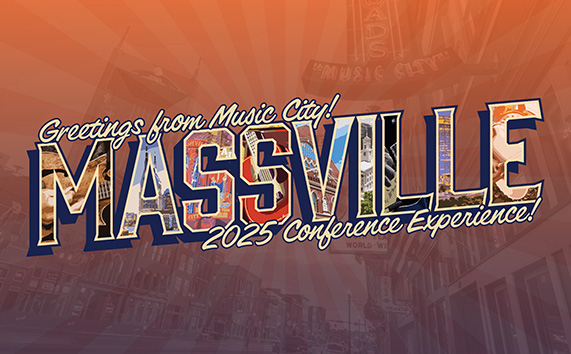
"MASSville" CONFERENCE EXPERIENCE 2025
Sunday, April 6th - Tuesday, April 8th, 2025 Nashville, Tennessee Don't miss out on an amazing guest speakers, special networking events, the Faith Belief Action Awards, and the 2025 School of the Year Contest! Not to mention getting to explore Downtown Nashville! You must be a member in order to attend! Ready to get started? Apply today!
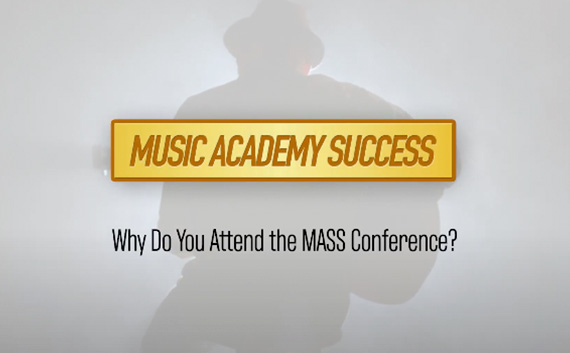
2022 MASS CONFERENCE TESTIMONIALS "ONE WAY TO ROCK" CONFERENCE

MASS CONFERENCE HIGHLIGHTS MASS IN MEMPHIS!
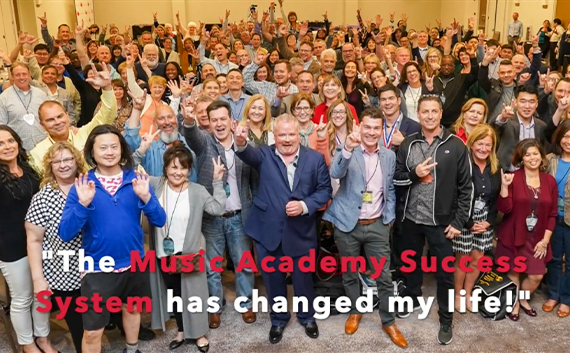
MASS SUCCESS STORIES MEMBER TESTIMONIALS
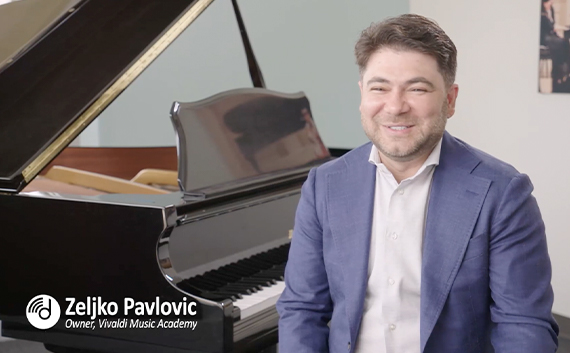
Are You Ready To Grow Your Music School?
If you want to get more music students, you can't miss this short documentary about Zeljko Pavlovic, the Director of the Vivaldi Music Academy. When he started with Music Academy Success® he had 5 students. Now he has over 4,000! Get your music studio on the right track today and check out Zeljko's amazing story with very specific details on how he accomplished his success. Are you ready to get more music students? Take the next step and apply online!

Glendora Music & Arts School
Congratulations to Luis Cordova for winning the MASS National School of the Year award. We had a great press conference and award presentation with his amazing team in Glendora California. The mayor pro tem of Glendora came, tons of certificates from Washington were sent from Congress, lots of love and acknowledgement of his hard work as a leader in music education and serving his community. He’s gone from 40 - 780 students and the best is yet to come.

Leading Note Studios
Congratulations to Camille Hastings and her entire team at Leading Note Studios in Encinitas, California on being the winners of the Music Academy Success School of the Year Award! Some inspiration for you all, she started MASS with 100 students. Today she has over 800!

Westminster Arts Academy
Congratulations to the Rios family (Francis, Augustina and Teresa), Directors of the Westminster Arts Academy in Los Angeles for winning the MASS National Music School of the Year Contest! Their awards ceremony was attended by Westminster Mayor Tri Ta, City Council members Charlie Nguyen and Kimberly Ho, and various other government and business officials. Check out their story in the L.A. Times.
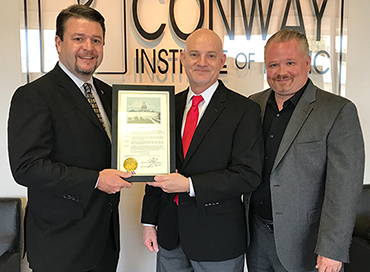
Conway Institute of Music
Congratulations to Jim Skelton, Director of the Conway Institute of Music for winning the MASS School of the Year Award! Jim has doubled his enrollment from 80 to over 300 students using the Music Academy Success System! Senator Rapert presented him with an official citation of achievement from the Arkansas Senate that will go in the permanent record of the state house. Check out his feature on the Little Rock Arkansas ABC station here.

Okemos Music Academy
Congratulations to John Dewey, Director of the Okemos Music Academy, Okemos Michigan for winning the MASS School of the Year Award! The Governor of Michigan and other state representatives also presented him with certificates of achievement acknowledging his leadership and success in the Music Academy industry at the Michigan state capital. Check out this article about his award from the Lansing State Journal .

New York Musician's Center
Congratulations to Dr. Talonda Thomas, Director of the New York Musician's Center in Bellmore, New York for winning the MASS School of the Year Award! Nassau County Legislator Steve Rhodes and Hempstead Councilwoman Erin King Sweeney also presented her with certificates of achievement acknowledging her leadership and success in the Music Academy industry. Her students and faculty regularly perform at Carnegie Hall in New York City!

Vivaldi Music Academy
Congratulations to Zeljko Pavlovic and Uma Kundu, Directors of the Vivaldi Music Academy, Houston, Texas for winning the MASS School of the Year Award! Zeljko went from zero students to over 400 in just ten months using the Music Academy Success System! He now has three locations and over 2,000 students. As winners of the contest they also received a check for $1,000! Check out this article about his success in the Houston Chronicle.

Music Academy of Acadiana
Congratulations to Tim Benson, Director of the Music Academy of Acadiana, Lafayette, Louisiana for winning the MASS School of the Year Award! He now has over 500 students and owns the building his school is in. The Mayor of Lafayette Joey Durel also attended his award ceremony as did the Lafayette ABC news station.
Learn more about Marty Fort
His business coaching methods have led small business owners to have documented increased gross profits of up to 100% in as little as twelve months with the Music Academy Success System.
Read our Success Stories
We Have More Success Testimonials Than Any Other Music School Marketing Program. Check out these great reviews!
1061 Lake Murray Blvd Second Floor Irmo, SC 29063
Call/text: 803-917-1434, [email protected].
grow-your-music-studio

Take My Profitable Music Lesson Business Plan

01 Sep | 2021
Take my profitable studio business plan.
Over the years, I have created blog posts and videos around MANY topics that are important to studio owners.
I’ve created really detailed posts about:
- How to successfully use ads in your business
- How to create a really persuasive website
- How to use group lessons to maximize profit (while still producing high quality students)
- How to use surveys to create your marketing
- How to diagnose why you aren’t getting more students
But – I’ve never given the high level overview in any one place.
In other words, I’ve been a little guilty of missing the forest because I’ve spent so much time talking about the trees…
Until now!!!!
I recently was invited to be a guest on the Female Musician Academy podcast.
On that podcast, I gave a complete studio business plan in about 45 minutes.
Never before have I painted the big picture as clearly as I did here…
So, if you are a novice at studio growth… this is going to be really helpful for you.
And – if you are more experienced – this will be a great refresher (and there are some new ideas and concepts that I talk about in here that I’ve never publicly shared before).
Click below to watch!
Would you rather read this?
Click here to download the transcript.
Video Content
(0:00) Introduction to the Podcast (0:47) Bree Noble Introduces Daniel / Daniel Shares His Background (3:56) “I thought online marketing was a secret!” Why local studio owners still use traditional methods (5:12) Case Study: How an L.A. Studio Owner 3x’d Her Income in 9 Months (10:30) Case Study Analysis: The Studio Owner’s Language and Offer (14:30) How making a specific offer defeats the “villain” for every parent (16:10) Is it wrong to “persuade” your audience? Who + how to you persuade? (19:36) Using social media to promote your studio – and avoiding the “endless treadmill” (22:06) Do you have to post on social media constantly for attention? (26:50) Your website’s biggest goal (27:40) The “perfectly wrapped” intro lesson that locks in students (30:48) What if people aren’t signing up for lessons? (32:24) Why do I need a website? Can’t I just use Instagram? (35:03) Can my website cover more than just my studio? (38:42) How can I scale my studio after I’m maxed out with 1-on-1 lessons? (41:08) Case Study: Studio Owner Minimized Work Hours with Group Lessons (43:00) How do you set a price for group lessons? (43:40) Why the learning environment is SO important – and how group lessons fit in (45:53) Are group lessons as valuable as private lessons? (46:54) How an online program can scale your studio (48:39) The “dream” of online music courses (51:10) The BEST business model for a music studio (52:36) Wrap-up and some extra “secret sauce”
One thing I’ve discovered over the years is that repeated exposure to concepts has helped me really internalize them.
You might want to bookmark this page… and come back to this one.
If you follow this model, and you use the tactics given… it wouldn’t surprise me if you achieve big results in your studio.
Hundreds of studios that have worked with Grow have used this plan to grow local private studios, international online studios, or create a large regional school (with this plan as the core).
You can use it, too!
What do you think? What questions do you have? Let me know in the comments!
- Latest Posts
Daniel Patterson
Latest posts by daniel patterson ( see all ).
- Training Teachers, Negative Thinking, and Group Lesson Challenges (Live Q&A Episode) [7FMS Ep. #128] - July 10, 2024
- Success Patterns of Big Music Academies (w. Sam L.) [7FMS Ep. #127] - July 3, 2024
- Tools and Tactics for Improving Teacher Performance (Part 2) [7FMS Ep. #126] - June 26, 2024
How Do You Want to Grow Your Studio?
Get More Students
Bring in $1000s in new revenue with a studio funnel
Begin Group Lessons
Start a high-quality group program that parents say “Yes!” to
Free Up Time
Scale your studio, make more, and in less time
Leave a comment Cancel reply
Your email address will not be published. Required fields are marked *
Save my name, email, and website in this browser for the next time I comment.

How To Grow Your Practice From Private Lessons To Music School

Building a stronger customer base and expanding operations are key objectives for any business. And, indeed, many music instructors who offer private lessons have similar aspirations regarding the development of their programs and earnings. However, growing your practice from regular weekly lessons into a music school isn’t just a matter of wishful thinking. You can make the transformation from part-time lesson provider to full time administrator of your own music school by following some specific steps.
Many teachers believe that a substantial investment of capital is necessary to enlarge their student outreach. And while a small amount of money is required to build a stronger client base, you can spread the word about your lesson availabilities for a very reasonable outlay through social media sites like Facebook, community involvement, and music education awareness. Then once business has increased, you can consider further expansion opportunities. Yet, this is the stage where many musicians falter. Moving from private lessons into a school setting is a big transition.
Step 1. Write a detailed, flexible business plan.
The business plan process may seem tedious, and you might be tempted to just “go through the motions,” but without developing an extensive, agile business plan you’re limiting the possibility of your success. This step is required by financial institutions for business loans for many reasons, but two of the most important include: it provides you with the knowledge you’ll need to operate the school, and it creates a roadmap for later reference so that you can adapt and mark milestones for achievement.
It’s a good idea to start developing your plan early. While you’re advertising and building a reputation within your locality, consider how many students you’d be able to reasonably teach at your current location. But, before you reach that outside number, start to consider alternative facilities. Your business plan should be agile and based on solid information. Don’t apply your most optimistic figures, use sober judgement and include methods for overcoming challenges.
Step 2. Utilize the resources available.
If you’ve been operating as a sole proprietor, there are many traditional routes available for finding and renting a facility for your expanded music school. However, one of the best methods, although it can be rather tedious, includes becoming a member of the SAM system . This is the official site for finding government owned properties and grants, and as a member you can search and apply for literally tens of thousands of educational grants. You can also monitor the federal owned facilities/properties in your area. If your music school qualifies, many of these buildings are free.
And although it will take some funds to modify a vacant property to meet your needs, never having to worry about monthly rent is a huge boost. Moreover, if you meet minority qualifications, there are additional low interest, secured loans available to help get you started.
Step 3. Focus on your students.
The business aspect of your music school shouldn’t interfere with the relationship you’ve built with your students. One of the most important things to remember when you are expanding private lessons to a music school is that your reputation as a teacher is a vital part of your success. Neglecting to provide the same sort of attention and emotional investment you’ve developed with each student up until this point will erode your success over time. So make sure that each of your students still receives the devotion and consideration you’ve always provided .
Step 4. Continue to solicit community support and involvement.
The surest way to ensure the lasting success of your music school is to continue to educate your community about the benefits of music instruction and education . You need to continue to do the things that built your clientele in the first place. Ideas include:
- Scheduling monthly or bi-monthly concerts for the community, such as at retirement centers or street fairs
- Including informative articles on your website or blog about the cognitive benefits of music therapy and training
- Participate in parades and other community celebrations
- Organize fund raisers that provide instruments and lessons for high-risk students who show an aptitude
These, and other activities will help promote the important work you do, and deliver long-lasting results.
Building your practice from individual lessons into a flourishing music school will take time and dedication, but by following the right steps, you can establish a foundation that will provide the best opportunity for realizing your dream.
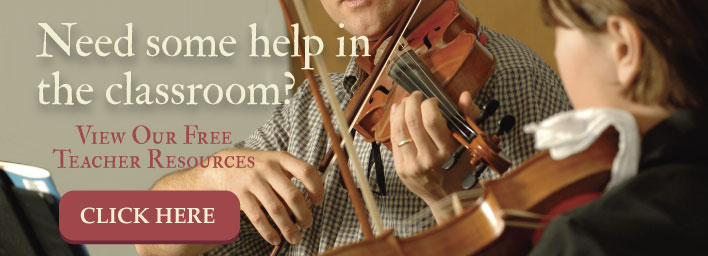
Share this article

Search StringOvation
Connolly music.
- Resource Center
- Shop our brands
StringOvation
- Latest articles
- Submit a guest post
Subscribe to StringOvation
Connolly family of brands.
- Thomastik-Infeld
- konig & meyer
- Magic Rosin
- THE REALIST
- Connolly Music Company
- 8 Vernon Valley Road, E. Northport, NY 11731
- 800.644.5268
- [email protected]
- M-F 9 am - 5 pm ET
- Copyright 2020 by Connolly Music Company. All rights Reserved
- Privacy Policy
- Terms & Conditions

Get Going → Events & Entertainment
A step-by-step guide to developing a music business plan
April 19, 2021

Why you need a music business plan
Where to start, the main components of a music business plan, the importance of multiple income streams, subscribe to greenlight by thimble..
Join a community of 50,000+ small business owners and get insights and inspo every other week
Related Articles

Making a living in the music business is the ultimate dream of every serious musician. But out of the countless individuals with a passion for music, only a select few will make a profitable business out of it. That doesn’t mean reaching your goals is impossible. If you want to earn reliable income from your music career, you need to treat it like any other business. That means making a detailed blueprint that will take you from passionate hobbyist to successful professional. This step-by-step guide to developing a music business plan will set you on the right path.
Whether your goal is to have a career as a professional musician, recording artist, producer, or music teacher, documenting the path you’ll take with a music business plan will be helpful to your cause. Your business plan outlines your goals, identifies the practical methods you’ll take to achieve them, and lists the resources you have and will need.
Not only will a concrete business plan keep you on course, it will also demonstrate your credibility in the eyes of others. Potential clients and business partners will see you as a professional and not another starving artist. If you ever need to take out a business loan or raise money for investors, a business plan is a must-have.
Crafting your music business plan isn’t something you can do in one sitting. You’ll need more than an afternoon to get this right. Take your time, bite off piece-by-piece, and chew your thoughts over thoroughly.
Our first piece of advice is as old as time: know thyself.
You need some clarity of purpose before you can craft a useful music business plan. Ask yourself:
- Who is my audience?
- What is my ultimate goal?
- Why do I want to do this?
Having this understanding will make it easier for you to explain your vision to others and convey your enthusiasm. It will also establish the framework for your music business. This step is crucial if you’ll need people to buy in to help you reach your goals.
The content of your music business plan will vary depending upon whether you’re aiming to start a music school, be a producer, or work as an artist. But the fundamental components are the same either way. Here’s what you’ll need:
- Mission Statement
- Executive Summary
- Audience Analysis
- SWOT Analysis
- Marketing Plan
- Financial Considerations
Let’s look at each of these in turn.
Mission Statement:
This can be as short as a few sentences, as long as it adequately describes who you are as an artist or a musical entrepreneur and what you’re trying to accomplish. While this might sound simple, think things through a bit before you try to draft your statement. Everything that follows here will hinge upon it.
Executive Summary:
The executive summary is a one-page synopsis of your plan. It should include an introduction as well as a description of your endeavors. Details about the funding you already have and what you’ll need in addition to a brief accounting of your plans for putting all of it into play are important too.
Most experts recommend saving the drafting of this part for last. It’s essentially a digest of all the other parts of your plan. Doing it last allows you to draw upon the information you’ve drafted for all of the other steps.
Audience Analysis:
Here’s where you’ll demonstrate your understanding of your target audience. If you’re already performing, teaching, or producing on the side, think about what traits the people who follow you have in common.
If you’re just getting started, find someone doing what you want to do whose style and circumstances are similar to yours, and analyze their target market. Create a demographic sketch of your target audience based on gender, age, location, musical tastes and favorite venues.
Strengths, Weaknesses, Opportunities & Threats:
Think about the qualities that make you unique. List everything that comes to mind, from technical mastery and creative spark to teaching older demographics and networking. Your skills might not seem extraordinary on an individual level, but combine all your best qualities and you’ll find there isn’t anyone quite like you on the market.
Don’t forget about your weaknesses. Identity these not as qualities to promote, but as areas to work on in the future. Being aware of your shortcomings will also help guide your decision on potential business partners in the future. Let your inner critic loose, but realize that this is an exercise in personal growth, not tearing yourself down.
Had enough reflecting? Let’s take a look at the marketplace. Think about potential gaps in the industry you can exploit. Perhaps your competitors are overlooking a key value and you see a way to provide it both efficiently and effectively. These are your opportunities.
Threats could include technological shifts, cultural changes, the emergence of new artists, competition, and new trends. The music world moves fast, and today’s hot act can end up as yesterday’s news before your can say “more cowbell!” Brainstorm any roadblocks you picture yourself facing over the next few years and strategies you can use to overcome them.
Marketing plan:
Your marketing plan will detail how you’ll spread the word about yourself. Consider how much money you can reasonably invest into marketing and work out how you’ll spend it to reach as many of the right people as possible. Think about how you’ll grow your online presence—including social media, a press kit, and publicity materials such as a logo and photography.
Get a full account of your current cash flow situation. List how much capital you currently have and estimate how much it’ll take to get your operation up and running. When in doubt, overestimate. Studio time, engineering talent, transportation, legal fee, copyrights and trademarks are all important considerations when projecting your budget.
Measuring your progress:
At what intervals will you go over the financials to see how you’re advancing? What are the milestones by which you’ll mark your achievements?
You’ll also need a method for measuring your impact on the market in terms of the reputation you build. Social media outlets provide analytical tools to help you track these metrics. They can also help you pinpoint the demographics of your audience.
Establishing your key performance indicators (KPIs) can help you set the standards by which you will gauge your success. Sharing this information with others makes you accountable because they can look at your projections and see how much progress you’ve made toward achieving them.
Summarizing your music business plan
As we mentioned above, once you have all of these areas covered, you can then condense the information each section contains to create your executive summary. After all, how will you know what to put in it until you’ve examined all of these other areas first?
Success in the music industry takes a lot of work and a little luck, but you can stack the deck in your favor by building multiple income streams. That way, if one area slows down, you’ll have another one in play to keep you rolling until the next opportunity presents itself. Revisit your strengths and opportunities and start brainstorming ideas. If you get stuck, here’s a quick list to get you started:
Give music lessons. Chances are if you’ve got the chops to play paid gigs, you’ve got enough skills to pass on to some novice students. Giving music lessons can be a great way to add some extra recurring income.
Start a YouTube channel. With over 2 billion active users, YouTube might just be your biggest source of untapped attention and potential. 1 The platform offers users a chance to learn or be entertained, and as a musician you’re well-positioned to offer both. You could upload instructional videos or footage of yourself performing. You’ll get to keep a portion of any ad revenue your videos make. And if the right person sees your content, it could open the doors to even greater opportunities.
Explore the marketing world. If composition is your thing, you might be overlooking a potentially huge money-maker—marketing and advertising. Brands are in constant need of good video content to market their products, and those videos need music to truly capture attention. If you’ve got a knack for putting together atmospheric instrumentals, creating music for ads could seriously help stabilize your income.
Open your own studio. If you have the capital to invest and live in an area underserved by recording studios, you might want to consider opening your own. While you’re not using it for your own projects, you can rent it out to other local musicians and producers. If there’s enough demand, you could cover the costs of equipment and rent and even have a little profit left over.
Explore session work. Sure, your band is your baby, but if you’ve got time on your hands and musical versatility to boot, why not offer your services as a session musician? Session work is an effective way to boost your income, make new connections and get your name out there as a legit professional. If an artist is truly enamoured with your work, they could invite you to join them on tour.
Another important consideration in your music business plan is protecting your livelihood from the consequences of unintentional accidents. General liability insurance is key to helping you stay focused on your business. Carrying a policy also demonstrates to potential clients that you are a serious professional — whether you’re a musician, DJ , or another kind of entrepreneur in the entertainment industry.
- Hootsuite. 25 YouTube Statistics that May Surprise You: 2021 Edition .
Our editorial content is intended for informational purposes only and is not written by a licensed insurance agent. Terms and conditions for rate and coverage may vary by class of business and state.

Get Greenlight in your inbox.
It's not every other newsletter. It's every other week, four minutes long, and just for small businesses.

Quick-thinking insurance for fast-moving businesses.
Backed by A-rated Insurance i
Best Insurance for the Smallest Businesses
Accredited Business
What do you do?
How to Start a Music Lessons Business
Many people’s interest in music goes beyond just listening to it. A lot of people who enjoy listening to it are also interested in learning how to play an instrument. A music lessons business gives novice musicians a way to learn to play an instrument, and it provides more seasoned musicians with advanced training to help them improve their musical abilities. A business may offer private or group lessons in home or classroom settings.
You may also be interested in additional side hustle ideas .
Learn how to start your own Music Lessons Business and whether it is the right fit for you.
Ready to form your LLC? Check out the Top LLC Formation Services .

Start a music lessons business by following these 10 steps:
- Plan your Music Lessons Business
- Form your Music Lessons Business into a Legal Entity
- Register your Music Lessons Business for Taxes
- Open a Business Bank Account & Credit Card
- Set up Accounting for your Music Lessons Business
- Get the Necessary Permits & Licenses for your Music Lessons Business
- Get Music Lessons Business Insurance
- Define your Music Lessons Business Brand
- Create your Music Lessons Business Website
- Set up your Business Phone System
We have put together this simple guide to starting your music lessons business. These steps will ensure that your new business is well planned out, registered properly and legally compliant.
Exploring your options? Check out other small business ideas .
STEP 1: Plan your business
A clear plan is essential for success as an entrepreneur. It will help you map out the specifics of your business and discover some unknowns. A few important topics to consider are:
What will you name your business?
- What are the startup and ongoing costs?
- Who is your target market?
How much can you charge customers?
Luckily we have done a lot of this research for you.
Choosing the right name is important and challenging. If you don’t already have a name in mind, visit our How to Name a Business guide or get help brainstorming a name with our Music Lessons Business Name Generator
If you operate a sole proprietorship , you might want to operate under a business name other than your own name. Visit our DBA guide to learn more.
When registering a business name , we recommend researching your business name by checking:
- Your state's business records
- Federal and state trademark records
- Social media platforms
- Web domain availability .
It's very important to secure your domain name before someone else does.
Want some help naming your music lessons business?
Business name generator, what are the costs involved in opening a music lessons business.
The costs associated with starting a music lessons business are low. Business owners need to have their own instrument, which is often the most expensive startup cost. Typically instruments cost anywhere from less than $300 up to over $2000 (with some instruments falling lower or higher than this range). Instruments can often be found cheaper if used, as well as online. In addition to an instrument, business owners usually need a couple music stands (one for them and one for a student, unless teaching piano or organ; ~$30 each) and their own personal copies of the music they’ll be teaching (students are usually expected to buy their own copies; ~$3 to $25 each).
Instructors also need a place to teach, which can be a room in their own home, at each client’s home or in a public place, such as at a school, church or community center. Renting a space in a public building will increase operating costs a little, but it also provides space for teaching group lessons.
What are the ongoing expenses for a music lessons business?
The ongoing expenses for music lessons businesses are low. Business owners who drive to clients’ homes must pay for transportation to and from each client’s house, and those who use a public space have to pay for that space. Other expenses include instrument maintenance and repair costs, and occasionally purchasing new copies of music.
Who is the target market?
Ideal clients have a passion for music and are interested in learning to create music. Many are either students in school (anywhere from elementary school through college) or adults who have free time that they can spend practicing.
How does a music lessons business make money?
A music lessons business charges students for lessons, which usually last from 30 minutes to 1 hour. Lessons may be charged on a per-lesson or hourly basis. Group lessons usually cost a little less than private lessons, but they can generate more income because there is more than one student being taught.
Piano lessons usually cost between $30 and $60 per hour . Many music lessons businesses that teach other instruments charge similar rates. When lessons are only a half-hour long, these rates are usually cut in half for each lesson.
How much profit can a music lessons business make?
Even a part-time music lessons business can generate a significant revenue. An instructor who offers private lessons for 20 hours a week could earn between $600 and $1200 each week if they charged $30 to $60 per hour. Because the ongoing expenses are low, the vast majority of this is profit.
How can you make your business more profitable?
Offering group lessons is one of the main ways music lessons businesses generate additional revenue. Group lessons might cost students slightly less per hour, but they can increase the revenue a business brings in. Even if students pay just $10 per lesson, a half-hour group lesson with four students could generate $40 in 30 minutes, or an hourly rate of $80.
Other ways of increasing revenue including offering repair services for broken instruments (if the instructor knows how to repair instruments) and hosting recitals. Many instructors charge additional fees for putting on an annual or semiannual recital.
Want a more guided approach? Access TRUiC's free Small Business Startup Guide - a step-by-step course for turning your business idea into reality. Get started today!
STEP 2: Form a legal entity
The most common business structure types are the sole proprietorship , partnership , limited liability company (LLC) , and corporation .
Establishing a legal business entity such as an LLC or corporation protects you from being held personally liable if your music lessons business is sued.
Form Your LLC
Read our Guide to Form Your Own LLC
Have a Professional Service Form your LLC for You
Two such reliable services:
You can form an LLC yourself and pay only the minimal state LLC costs or hire one of the Best LLC Services for a small, additional fee.
Recommended: You will need to elect a registered agent for your LLC. LLC formation packages usually include a free year of registered agent services . You can choose to hire a registered agent or act as your own.
STEP 3: Register for taxes
You will need to register for a variety of state and federal taxes before you can open for business.
In order to register for taxes you will need to apply for an EIN. It's really easy and free!
You can acquire your EIN through the IRS website . If you would like to learn more about EINs, read our article, What is an EIN?
There are specific state taxes that might apply to your business. Learn more about state sales tax and franchise taxes in our state sales tax guides.
STEP 4: Open a business bank account & credit card
Using dedicated business banking and credit accounts is essential for personal asset protection.
When your personal and business accounts are mixed, your personal assets (your home, car, and other valuables) are at risk in the event your business is sued. In business law, this is referred to as piercing your corporate veil .
Open a business bank account
Besides being a requirement when applying for business loans, opening a business bank account:
- Separates your personal assets from your company's assets, which is necessary for personal asset protection.
- Makes accounting and tax filing easier.
Recommended: Read our Best Banks for Small Business review to find the best national bank or credit union.
Get a business credit card
Getting a business credit card helps you:
- Separate personal and business expenses by putting your business' expenses all in one place.
- Build your company's credit history , which can be useful to raise money later on.
Recommended: Apply for an easy approval business credit card from BILL and build your business credit quickly.
STEP 5: Set up business accounting
Recording your various expenses and sources of income is critical to understanding the financial performance of your business. Keeping accurate and detailed accounts also greatly simplifies your annual tax filing.
Make LLC accounting easy with our LLC Expenses Cheat Sheet.
STEP 6: Obtain necessary permits and licenses
Failure to acquire necessary permits and licenses can result in hefty fines, or even cause your business to be shut down.
State & Local Business Licensing Requirements
Certain state permits and licenses may be needed. Learn more about licensing requirements in your state by visiting SBA’s reference to state licenses and permits.
In addition, certain local licensing or regulatory requirements may apply. For more information:
- Check with your town, city or county clerk’s office
- Get assistance from one of the local associations listed in US Small Business Associations directory of local business resources.
Most businesses are required to collect sales tax on the goods or services they provide. To learn more about how sales tax will affect your business, read our article, Sales Tax for Small Businesses .
Service Agreement
Music lessons businesses should consider requiring clients to sign a service agreement before starting a new project. This agreement should clarify client expectations and minimize risk of legal disputes by setting out payment terms and conditions, service level expectations, and intellectual property ownership. Here is an example service agreement.
Recommended: Rocket Lawyer makes it easy to create a professional service agreement for your business when you sign up for their premium membership. For $39.95 per month, members receive access to hundreds of legal agreements and on call attorneys to get complimentary legal advice.
Certificate of Occupancy
Some business owners travel to clients’ homes to offer lessons. However, if you chose to open a studio to offer music lessons - your studio will need to have an appropriate Certificate of Occupancy (CO) . A CO confirms that all building codes, zoning laws and government regulations have been met.
If you plan to lease a studio:
- It is generally the landlord’s responsibility to obtain a CO.
- Before leasing, confirm that your landlord has or can obtain a valid CO that is applicable to a music lessons business. If your landlord does not have a CO suitable to a music lessons business, your studio could be shut down in the event of noise complaints from neighboring tenants.
- After a major renovation, a new CO often needs to be issued. If your place of business will be renovated before opening, it is recommended to include language in your lease agreement stating that lease payments will not commence until a valid CO is issued.
If you plan to purchase or build a location (e.g. lesson studio):
- You will be responsible for obtaining a valid CO from a local government authority.
- Review all building codes and zoning requirements for you business’ location to ensure your business will be in compliance and able to obtain a CO.
STEP 7: Get business insurance
Just as with licenses and permits, your business needs insurance in order to operate safely and lawfully. Business Insurance protects your company’s financial wellbeing in the event of a covered loss.
There are several types of insurance policies created for different types of businesses with different risks. If you’re unsure of the types of risks that your business may face, begin with General Liability Insurance . This is the most common coverage that small businesses need, so it’s a great place to start for your business.
Another notable insurance policy that many businesses need is Workers’ Compensation Insurance . If your business will have employees, it’s a good chance that your state will require you to carry Workers' Compensation Coverage.
FInd out what types of insurance your Music Lessons Business needs and how much it will cost you by reading our guide Business Insurance for Music Lessons Business.
STEP 8: Define your brand
Your brand is what your company stands for, as well as how your business is perceived by the public. A strong brand will help your business stand out from competitors.
If you aren't feeling confident about designing your small business logo, then check out our Design Guides for Beginners , we'll give you helpful tips and advice for creating the best unique logo for your business.
Recommended : Get a logo using Truic's free logo Generator no email or sign up required, or use a Premium Logo Maker .
If you already have a logo, you can also add it to a QR code with our Free QR Code Generator . Choose from 13 QR code types to create a code for your business cards and publications, or to help spread awareness for your new website.
How to promote & market a music lessons business
Music lessons businesses often grow by word of mouth. Posting ads locally on Craigslist, bulletin boards and in newspapers can also help, though. Ads can also be posted where musicians frequent, such as schools, instrument shops, etc.
How to keep customers coming back
There are two main ways that music lessons businesses set themselves apart. Some offer inexpensive lessons, undercutting other businesses’ prices. Others specialize in just one or two instruments and gain a reputation as being the best music lessons business in the area for these select instruments. These businesses usually have an instructor who either has degrees in music or is a member of a successful group.
STEP 9: Create your business website
After defining your brand and creating your logo the next step is to create a website for your business .
While creating a website is an essential step, some may fear that it’s out of their reach because they don’t have any website-building experience. While this may have been a reasonable fear back in 2015, web technology has seen huge advancements in the past few years that makes the lives of small business owners much simpler.
Here are the main reasons why you shouldn’t delay building your website:
- All legitimate businesses have websites - full stop. The size or industry of your business does not matter when it comes to getting your business online.
- Social media accounts like Facebook pages or LinkedIn business profiles are not a replacement for a business website that you own.
- Website builder tools like the GoDaddy Website Builder have made creating a basic website extremely simple. You don’t need to hire a web developer or designer to create a website that you can be proud of.
Recommended : Get started today using our recommended website builder or check out our review of the Best Website Builders .
Other popular website builders are: WordPress , WIX , Weebly , Squarespace , and Shopify .
STEP 10: Set up your business phone system
Getting a phone set up for your business is one of the best ways to help keep your personal life and business life separate and private. That’s not the only benefit; it also helps you make your business more automated, gives your business legitimacy, and makes it easier for potential customers to find and contact you.
There are many services available to entrepreneurs who want to set up a business phone system. We’ve reviewed the top companies and rated them based on price, features, and ease of use. Check out our review of the Best Business Phone Systems 2023 to find the best phone service for your small business.
Recommended Business Phone Service: Phone.com
Phone.com is our top choice for small business phone numbers because of all the features it offers for small businesses and it's fair pricing.
Is this Business Right For You?
People who are passionate about music and can play at least one instrument well may be interested in starting a music lessons business. Music teachers in schools and band members are especially qualified, as they both have credentials and connections to people who love music. People don’t have to be a music teacher or in a band to start a music lessons business, though.
Business owners should have a significant amount of time available for teaching lessons, but this time doesn’t need to be during typical business hours.
Want to know if you are cut out to be an entrepreneur?
Take our Entrepreneurship Quiz to find out!
Entrepreneurship Quiz
What happens during a typical day at a music lessons business?
Music lessons business owners spend many hours teaching lessons, either one-on-one or in group settings. Depending on their particular business model, instructors may also drive to and from students’ homes, and they might have to repair or maintain instruments. Additionally, music lessons business owners will need to spend time constructing/finding lessons that are suited to their students’ skill level.
What are some skills and experiences that will help you build a successful music lessons business?
A music lessons business owner should know how to play at least one instrument very well, and knowing multiple instruments is helpful. While some instructors are self-taught, completing a formal training program ensures an instructor is highly skilled and provides credibility. Many colleges, universities and other education programs offer bachelor’s, master’s and doctoral degrees in music and music education, and certificate programs are also available throughout the country.
It’s also helpful if instructors know how to maintain and repair their own instruments. This isn’t a vital skill, as an instructor can have someone else perform repairs when necessary. Instructors who do their own repairs can keep their costs lower, though. People who want to learn to repair their instruments may learn how to from fellow musicians who are more knowledgeable or through a certification program.
What is the growth potential for a music lessons business?
Most music lessons businesses have one teacher, who is also the business owner. Businesses with a single instructor are limited by how much time the instructor can spend teaching students. An instructor who taught half-hour private lessons full time (40 hours per week) would be able to teach up to 80 students per week. Many instructors have other jobs and, therefore, can only teach part time.
A few music lessons businesses, however, have multiple instructors. If a business elects to hire instructors, there isn’t a limit to how large the business could become. In theory, a business could have lots of instructors offering lessons on many different instruments, and it could open up locations in other cities to reach even more students.
Not sure if a music lessons business is right for you? Try our free Business Idea Generator and find your perfect idea.
TRUiC's YouTube Channel
For fun informative videos about starting a business visit the TRUiC YouTube Channel or subscribe to view later.
Take the Next Step
Find a business mentor.
One of the greatest resources an entrepreneur can have is quality mentorship. As you start planning your business, connect with a free business resource near you to get the help you need.
Having a support network in place to turn to during tough times is a major factor of success for new business owners.
Learn from other business owners
Want to learn more about starting a business from entrepreneurs themselves? Visit Startup Savant’s startup founder series to gain entrepreneurial insights, lessons, and advice from founders themselves.
Resources to Help Women in Business
There are many resources out there specifically for women entrepreneurs. We’ve gathered necessary and useful information to help you succeed both professionally and personally:
If you’re a woman looking for some guidance in entrepreneurship, check out this great new series Women in Business created by the women of our partner Startup Savant.
How and when to build a team
A music lessons business doesn’t necessarily require multiple employees. If a business owner wants to hire additional instructors, they usually do so when the number of students requesting lessons exceeds the number of lessons they have available. Most instructors, however, either raise their rates at this point in time or increase how many group lessons they offer. These strategies let them increase their revenue without taking on an employee.
Useful Links
Industry opportunities.
- Back to Rock music school franchise opportunity
- School of Rock music school franchise opportunity
- Music Teachers National Association
- National Association for Musical Education
Real World Examples
- Music and Art’s The Lesson Studio: a large collection of stores offering music lessons
- Ann Arbor-based music school
- Guide discussing business plan for music lesson business
Further Reading
- Blog: about starting and running a music lessons business
- Book: starting a guitar lessons business
- Video series: Q&A for starting and managing a music lessons business
- Blog: about starting a music teaching studio
Entrepreneur Interviews
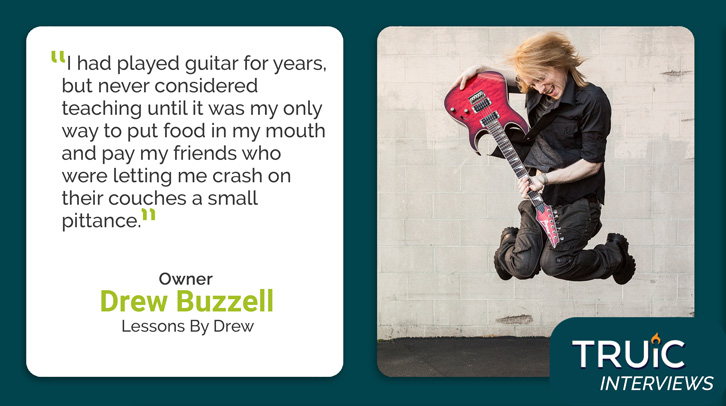
Read Interview
Have a Question? Leave a Comment!
Financial modeling spreadsheets and templates in Excel & Google Sheets
- Your cart is empty.

Music School Financial Model Excel Template
Try Music School Financial Model. Excel template – robust and powerful. This is your solid foundation to plan your business model. Five-year financial model template for Excel for Music School Startup Financial Model with prebuilt three statements – consolidated pro forma income statement, balance sheet, and cash flow statement for 5 years. Key financial charts, summaries, metrics, and funding forecasts built-in. Created with the mind of the music school business. Music School Financial Model helps to estimate required startup costs. Unlocked – edit all – last updated in Sep 2020. Basic Excel knowledge and minimal previous financial planning experience is required to use a sophisticated music school three statement financial model: however, fully sufficient to impress bankers and investors with a proven, solid financial model.
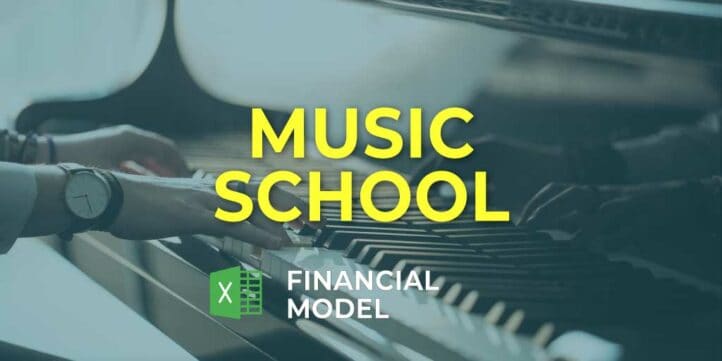
| , |
| , , , , , , , |
NOTE: Single-User pertains to a limited Single User License where the template can only be used by one single user; while Multi-User is a license for users sharing the template with up to 20 members. Please refer to Terms of Use and License and Permitted Use for clarification.
MUSIC SCHOOL PRO FORMA TEMPLATE KEY FEATURES
Video tutorial:
Avoid Cash Flow Shortfalls Unexpected Pro Forma Cash Flow Projection shortfalls can cause significant damage to your business, and it may take months to recover. Negative Cash Flow can appear if you don’t continuously track the incoming cash and outgoing of your business. Fortunately, you can solve Startup Cash Flow Projection shortfalls with a bit of effort. Forecasting your Cash Flow Projection will help you identify — and plan for — market fluctuations, sales seasonality, and other cases that can lead to unpredictable Startup Cash Flow Statements. Cash Flow Statement Proforma can even help you visualize Startup Cash Flow Projection trends with the help of automatically generated charts and graphs.
Saves you time Allows you to spend less time on Pro Forma Cash Flow Projection and more time on your products, customers, and business development
All necessary reports When creating a Music School Financial Model Excel, you will not need to independently prepare financial reports and study the requirements for them. Our Excel template contains all the necessary reports and calculations that correspond with the lenders’ demand.
Build your plan and pitch for funding Impress bankers and investors with a proven, solid music school financial model that impresses every time.
External stakeholders, such as banks, may require a regular forecast. If the business has a bank loan, the bank will ask for a Music School Budget Spreadsheet regularly.
Update anytime You can easily adjust inputs at the launch stage and throughout the further activities of your business to refine your Music School Three Statement Financial Model Template.
REPORTS and INPUTS
CAPEX CapEx (short for capital expenditures) is the company’s expenses related to the acquisition, maintenance, or improvement of fixed assets such as property, buildings, factories, equipment, and technology. CapEx is included in the balance sheet, and it also can be reflected partially in the profit and loss proforma and cash flow statement projection.
Financial KPIs The Music School 3 Way Financial Model has key financial indicators (KPIs) that show sales and profitability performance: revenue growth rate, gross margin, and EBITDA margin. It also has KPIs related to cash flows and raising investment: the cash burn rate, runway, and funding need. You can choose the KPIs relevant to your company and industry, and monitor your company’s performance. For example, SaaS companies typically monitor and manage customer lifetime value (LTV), customer acquisition costs (CAC), LTV/CAC ratio, and the churn rate. For SaaS businesses, these KPIs are crucial.
Profitability KPIs Gross profit margin. A gross profit margin is a measure of a company’s profitability, which is calculated by dividing gross profit by net sales.
Top Revenue The Top revenue tab in the Cashflow Projection shows off the financial information regarding each of your offerings. In particular, with the help of this Music School Startup Financial Model, you can obtain an annual breakdown of your revenue streams, including the revenue depth and revenue bridge.
Performance KPIs Sales growth is year-to-date. Every entrepreneur wants to see the company grow month-over-month. In some industries, sales depend on the season or other external factors. The sales growth year-to-date metric shows the pace at which the company’s sales revenue increases or decreases.
Users can monitor sales volumes over various periods – daily, weekly, monthly, or yearly. Sales growth metric helps to manage sales growth goals in the form of a percentage of last month’s sales volume or others. If the company has several sales teams, the management can monitor this metric for each team separately. It will help to monitor better each team’s achievements.
Loan opt-in A loan amortization schedule template reflects the company’s schedule to which it repays its loans. Our Music School Pro Forma Template has a loan amortization schedule with pre-built formulas that shows the amount of each installment and much principal and interest the company should repay each month, quarter, or year.
Operational KPIs Our Music School Cash Flow Proforma Template has various operational performance graphs that will help business owners manage their business’ finances and measure their overall performance. These operational performance graphs also help in making wise business decisions that consider the company’s financial capability.
The financial graphs in this Music School Financial Model In Excel Template help measure the company’s financial health showing the operating cash flows’ analysis, return on investment, debt to equity ratio, liquidity ratios, and other relevant financial information. Business owners can use these operational performance graphs both for internal and external purposes.
In particular, they can use these graphs to assess the company’s overall financial performance or for the assessment of the project’s financial feasibility. Such an approach will improve the financial management efficiency of the company. Business owners can also use these charts and graphs for presentations for potential investors and bankers. The operational performance graphs have all the necessary pre-built formulas, and they are fully formatted. So, the users can just print out them and bring them to the meeting with investors.
File types:
Excel – Single-User: .xlsx Excel – Multi-User: .xlsx Free Demo – .xlsx
- Excel – Multi-User – $129.00
- Excel – Single-User – $99.00
- Free Demo – $0.00
Add to wish list
Similar Products
Other customers were also interested in....
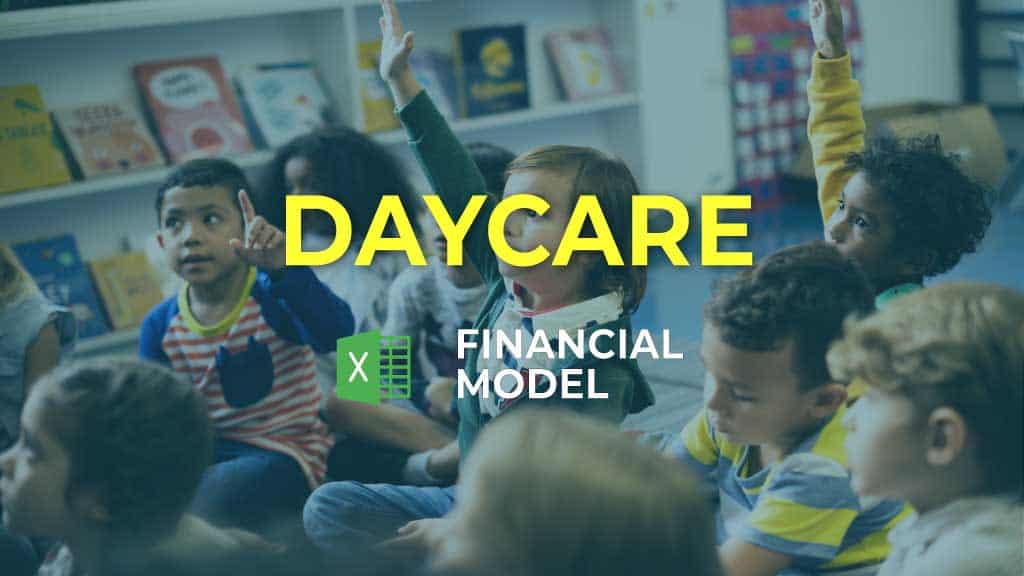
HenrySheykin
Day care financial model excel template.
Discover Daycare Financial Model. Spend less time on Cash Flow forecasting and more time on your pro... Read more
- Excel - Multi-User – $129.00 Version 1
- Excel - Single-User – $99.00 Version 1
- Free Demo – $0.00 Version 1

Flight School Financial Model Excel Template
Check Flight School Pro-forma Template. Solid package of print-ready reports: P&L and Cash Flow ... Read more
- Excel - Multi-User – $129.00
- Excel - Single-User – $99.00

Martial Arts School Financial Model Excel Template
Order Martial Arts School Financial Model Template. Enhance your pitches and impress potential inves... Read more

Driving School Financial Model Excel Template
Discover Driving School Financial Model. Fortunately, you can solve Cash Flow shortfalls with a bit ... Read more

Foreign Languages School Financial Model Excel Tem...
Check Our Foreign Languages School Pro Forma Projection. Spend less time on Cash Flow forecasting an... Read more

Fight School Financial Model Excel Template
Check Our Fight School Financial Plan. Sources & Uses, Profit & Loss, Cash Flow statements, ... Read more

Dog Obedience School Financial Model Excel Templat...
Order Dog Obedience School Financial Model Template. Use this Excel to plan effectively, manage Cash... Read more

Dance School Financial Model Excel Template
Get the Best Dance School Pro Forma Projection. Enhance your pitch decks and impress potential inves... Read more

Beauty School Financial Model Excel Template
Order Your Beauty School Financial Model. There's power in Cash Flow Projections and the insight the... Read more

Child Governance Financial Model Excel Template
Shop Child Governance Pro Forma Projection. Impress bankers and investors with a proven, strategic b... Read more
You must log in to submit a review.
Username or Email Address
Remember Me
Request submitting Please wait...
Vendor Contact Form
- Log into Your Account
- Register New Account
Please register to contact the author.
Receive regular updates on new model templates
Attachments
(Maximum file upload limit is 10MB)

Bachelor of Music in Music Business/Management
Cultivate an entrepreneurial mindset and a passion for the contemporary music business and management industries.
Music Business/ Management
- Bachelor of Music
- Bachelor of Arts
- Minor in Creative Entrepreneurship
- Minor in Business of Live Music
- Graduate Program
- Accelerated MBA
- Visiting Artists
- In the News
- Declare Your Major
- Scholarships
As a music business major, you’ll learn the fundamentals of business within the music industry from a musician’s perspective. Over eight semesters, while completing the college’s core music curriculum, you’ll immerse yourself in the legal, financial, artistic, and ethical issues that face the contemporary music business professional. By networking with a diverse community of musicians, faculty, and industry professionals on the college’s Boston campus, you’ll gain real world experience while earning a bachelor's degree.
The Music Business/Management major offers three tracks:
Management | Marketing | Entrepreneurial
Learn the fundamentals of business from a musician’s perspective.
Over eight semesters, you’ll immerse yourself in the legal, financial, artistic, and ethical issues that face the contemporary music business professional.
Tuition and Financial Aid
Learn about financial aid, scholarships, and others ways of paying for your Berklee education .
Study Abroad
Study abroad at our Valencia, Spain, campus . It is recommended that MB/M majors study in Valencia during their fourth, fifth, or sixth semester. For specific program information, please see the chair of your major or contact the study abroad office .
Are you interested in music business, but not in pursuing a career as a musician?
Berklee now offers a new Bachelor of Arts degree that gives students a foundation in design thinking and strategic leadership, without the emphasis on the core music curriculum. There is no audition to apply.
Note that you must apply directly to the Bachelor of Arts program and cannot transfer to a Bachelor of Music program without reapplying to the college.

Alumni Story
Sony Music U.S. Latin President Nir Seroussi B.M. '96
Nir Seroussi B.M. ’96 discusses his Berklee experience and the future of music labels during his keynote interview at the 23rd Annual James G. Zafris Lecture for Music Business/Management.

Meet Your Mentors
Berklee Appoints First Woman Assistant Chair of Music Business/Management
Tonya Butler brings extensive industry experience to her new role as assistant chair of music business/management.
Program Details
Full description.
As a student majoring in music business/management, you will learn the music industry skills, concepts, and methodologies necessary to manage the legal, financial, artistic, and ethical issues that face the contemporary music business professional. You can select one of three available tracks within the major: self-directed or entrepreneurial activity, music products, or management in corporate environments.
You will demonstrate functional mastery of necessary skills and concepts by completing a final capstone project/experience with portfolio documentation, depending upon the major track chosen. This experience will be an industry internship, leadership participation in an ongoing college model music industry project, or both.
In addition, you'll develop a critical understanding of the criteria of quality work in music business and management environments via your course work, case studies, and exposure to guest lecturers, among other avenues of learning. Through group projects and other class activities, you'll explore how to work effectively with others in groupings typically found in the music business, and you'll develop your ability to nimbly adapt to changes in music business and management environments.
What Will I Learn?
Upon completion of a major in music business/management, students will:
- synthesize the terminology of the music industry;
- apply copyright and intellectual property law as related to the music industry;
- develop effective promotion and marketing mechanisms for monetizing music;
- communicate effectively within business environments (musically, orally, and in writing);
- apply contemporary business practices to corporate and entrepreneurial environments;
- assess financial and economic considerations in the commerce of music;
- integrate, employ, and forecast technological applications as they appear in business environments; and
- synthesize and apply leadership models, and the ethical considerations upon which they are founded.
Entrance Requirements
As an enrolled Berklee College of Music undergraduate student, you will declare a major field of study by your third semester. Learn how to declare the major for music business/management (login required).
Students interested in this major must have a grade point average (GPA) of 2.0 from first semester of study in the bachelor of music degree program.
Curriculum and Courses
There are 36 required credits specific to this major (6 LAS credits, 17 major core credits, and 13 music business track credits) in addition to the B.M. required core music courses (41 credits), liberal arts courses (39 credits, 6 of which count towards LAS major requirements), and general electives (10 credits) for a degree total of 120 credits. See the sample curriculum here.
Core courses for all music business majors:
- MB-201 Principles of Business Management (2 credits)
- MB-211 Legal Aspects in the Music Business (2 credits)
- MB-255 Computer Applications in the Music Business (2 credits)
- MB-275 Principles of Financial Accounting (2 credits)
- MB-301 Business Leadership and Ethics (2 credits)
- MB-325 Principles of Marketing (2 credits)
- MB-389 Managing Technology-Driven Business (2 credits)
- MB-395 Business Finance (2 credits)
Major specific liberal arts and sciences courses:
- LSOC-225 Principles of Economics
- LMSC-251 Data Management and Statistics
Management track:
- MB-331 Record Company Operations (2 credits)
- MB-335 Music Publishing (2 credits)
- MB-375 Music Intermediaries: Agents, Managers, and Attorneys (2 credits)
- MB-391 Concerts and Touring (2 credits)
- MB-495 Internship in Music Business and Management or an approved Advanced Music Business Elective elective (2 credits; see major grid )
Marketing track:
- MB-337 Music Product Development (2 credits)
- MB-341 Creative Promotion in New Media (2 credits)
- MB-421 Digital Marketing in the Music Industry (2 credits)
- MB-495 Internship in Music Business and Management or an approved Advanced Music Business Elective (2 credits; see major grid )
Entrepreneurial track:
- MB-340 : Business Startups (2 credits)
- MB-387 : Website Design and Management (2 credits)
- MB-435 : Innovators' DNA (2 credits)
- MB-495 Internship in Music Business and Management or an approved Advanced Music Business Elective (2 credits; see major grid )
All three concentrates require major electives as well. Please see the major grids for specific information.
Updated for catalogue year fall 2022
Sample Curriculum by Semester
Related programs.
You might also like these other Berklee programs:

- Share full article
For more audio journalism and storytelling, download New York Times Audio , a new iOS app available for news subscribers.

- Apple Podcasts
- Google Podcasts
Why Britain Just Ended 14 Years of Conservative Rule
Last week, the center-left labour party won the british general election in a landslide..

Hosted by Natalie Kitroeff
Featuring Mark Landler
Produced by Rob Szypko , Nina Feldman and Will Reid
Edited by Brendan Klinkenberg
With Paige Cowett
Original music by Dan Powell , Diane Wong and Marion Lozano
Engineered by Alyssa Moxley
Listen and follow The Daily Apple Podcasts | Spotify | Amazon Music | YouTube
For more than a decade, Britain has been governed by the Conservative Party, which pushed its politics to the right, embracing smaller government and Brexit. Last week, that era officially came to an end.
Mark Landler, the London bureau chief for The Times, explains why British voters rejected the Conservatives and what their defeat means in a world where populism is on the rise.
On today’s episode

Mark Landler , the London bureau chief for The New York Times.

Background reading
Five takeaways from the British general election.
The Conservatives have run Britain for 14 years. How have things changed in that time?
There are a lot of ways to listen to The Daily. Here’s how.
We aim to make transcripts available the next workday after an episode’s publication. You can find them at the top of the page.
The Daily is made by Rachel Quester, Lynsea Garrison, Clare Toeniskoetter, Paige Cowett, Michael Simon Johnson, Brad Fisher, Chris Wood, Jessica Cheung, Stella Tan, Alexandra Leigh Young, Lisa Chow, Eric Krupke, Marc Georges, Luke Vander Ploeg, M.J. Davis Lin, Dan Powell, Sydney Harper, Michael Benoist, Liz O. Baylen, Asthaa Chaturvedi, Rachelle Bonja, Diana Nguyen, Marion Lozano, Corey Schreppel, Rob Szypko, Elisheba Ittoop, Mooj Zadie, Patricia Willens, Rowan Niemisto, Jody Becker, Rikki Novetsky, Nina Feldman, Will Reid, Carlos Prieto, Ben Calhoun, Susan Lee, Lexie Diao, Mary Wilson, Alex Stern, Sophia Lanman, Shannon Lin, Diane Wong, Devon Taylor, Alyssa Moxley, Olivia Natt, Daniel Ramirez and Brendan Klinkenberg.
Our theme music is by Jim Brunberg and Ben Landsverk of Wonderly. Special thanks to Sam Dolnick, Paula Szuchman, Lisa Tobin, Larissa Anderson, Julia Simon, Sofia Milan, Mahima Chablani, Elizabeth Davis-Moorer, Jeffrey Miranda, Maddy Masiello, Isabella Anderson, Nina Lassam and Nick Pitman.
Natalie Kitroeff is the Mexico City bureau chief for The Times, leading coverage of Mexico, Central America and the Caribbean. More about Natalie Kitroeff
Mark Landler is the London bureau chief of The Times, covering the United Kingdom, as well as American foreign policy in Europe, Asia and the Middle East. He has been a journalist for more than three decades. More about Mark Landler
Advertisement

COMMENTS
30+ Business Models for Private Music Lessons! What if there was a better model for running your studio? Well, the research has been done for you! This resource will breakdown 30+ teaching business models from around the world and walk you through some reflection questions to help you determine which model is best for you. Get Instant Access.
A Sample Music School Business Plan Template. 1. Industry Overview. First and foremost, it is important to state that the music school line of business can safely be categorized under the Fine Arts Schools industry. Basically, players in the Fine Arts industry offer instruction in the arts, including art, dance, drama, music and photography.
Step 3: Draft a business plan - Develop a comprehensive business plan with a clear roadmap for how your music school will operate and grow in the future. Step 4: Create a financial model - Plan your finances strategically by forecasting income, expenses, and profits for your music school business.
Here are the key steps to consider when writing a business plan: 1. Executive Summary. An executive summary is the first section planned to offer an overview of the entire business plan. However, it is written after the entire business plan is ready and summarizes each section of your plan.
Let's go through the content of each section in more detail! 1. The executive summary. The first section of your music school's business plan is the executive summary which provides, as its name suggests, an enticing summary of your plan which should hook the reader and make them want to know more about your business.
Develop a clear understanding of the music school's structure. 2-4 weeks. $500-$1,000. Conduct Market Research. Analyze the local market to understand the demand for music education. 4-6 weeks. $1,000-$2,000. Create a Business Plan. Draft a detailed business plan outlining the mission, vision, strategy.
The best ways to get to grips with the music school's business model are to: Talk to music school owners with experience; Work a few months in a music school already in operation; Take a training course; Talk to music school owners with experience. Experienced music school owners have valuable insights and can provide practical advice based on ...
Starting a music school could be the perfect business venture for you. According to recent statistics, the music education market has been experiencing steady growth, with an estimated worth of $8.9 billion in 2020 and a projected growth rate of 6.9% from 2021 to 2026 .
30+ Business Models for Private Music Lessons. 0:03. CLICK HERE TO DOWNLOAD PDF. WANT ALL OUR BEST RESOURCES FOR BUILDING A SUCCESSFUL MUSIC TEACHING BUSINESS? GIVE ME FREE ACCESS! Ever wondered how many different models there are for running a music teaching business? 🤷🏻♀️ This free PDF will give you a deep dive into 30+ models ...
Step 4: Secure Funding. Starting a music school requires a significant investment in equipment, rent, staffing, and marketing expenses. You can finance your music school through personal savings, loans from family and friends, or by securing a business loan from a financial institution. You should also explore grant opportunities from government agencies, non-profit organizations, and private ...
Create your music school business plan. Find the right venue for your music school. Hire office staff and teachers. Focus on getting organized. Grow your music school with marketing. Start Your Music School. If you're ready to learn more about how to start a music school, read on for details. 1.
30+ Business Models For Music Lessons. THE ... HERE'S HOW THE 'BUILD A MUSIC SCHOOL' MEMBERSHIP CAN HELP YOU CREATE A WILDLY SUCCESSFUL MUSIC TEACHING BUSINESS! ... Building a successful music teaching business can be hard. Really hard! Whether you're trying to learn from YouTube, free Facebook groups, or books, it's SUPER abstract, and you ...
These are the questions your business plan would help you answer. Your music school business plan should be the working document with which you can use to run your business - it is the blueprint of your business. 2. Raise Your Start - Up Capital. After you must have been through with drafting your business plan, you would have an idea of ...
With over 15 years of experience, we'll show you how to grow your music school, build a music school and get more music students (and fast). We have worked with music schools in the U.S., Canada, South America, Asia, Africa, Europe, Australia, and the Middle East. We offer a cutting edge training program including the latest information with ...
Get all our best music school resources for FREE: https://www.buildamusicschool.com/7-Day_Free_Trial----Social'sINSTAGRAM: https://www.instagram.com/buildamu...
(46:54) How an online program can scale your studio (48:39) The "dream" of online music courses (51:10) The BEST business model for a music studio ... writer, and marketing consultant for music schools. He began teaching in 2004. He co-founded and led marketing operations for a summer music camp that sees over 200 children each summer.
Space and Supplies. Building your music school involves finding and occupying the space you need to grow and developing your stock, storage and instruction areas. With your non-profit status in the U.S., you are able to view and bid on government properties, including foreclosures. However, depending on your location, search for a facility that ...
Chapter #2 — Reality: old business model, new ecosystem You're a music artist or label. Imagine a big sheet of paper, where you can write down every single element of your music business.
Step 3. Focus on your students. The business aspect of your music school shouldn't interfere with the relationship you've built with your students. One of the most important things to remember when you are expanding private lessons to a music school is that your reputation as a teacher is a vital part of your success.
The main components of a music business plan. The content of your music business plan will vary depending upon whether you're aiming to start a music school, be a producer, or work as an artist. But the fundamental components are the same either way. Here's what you'll need: Mission Statement. Executive Summary.
STEP 2: Form a legal entity. The most common business structure types are the sole proprietorship, partnership, limited liability company (LLC), and corporation. Establishing a legal business entity such as an LLC or corporation protects you from being held personally liable if your music lessons business is sued.
Try Music School Financial Model. Excel template - robust and powerful. This is your solid foundation to plan your business model. Five-year financial model template for Excel for Music School Startup Financial Model with prebuilt three statements - consolidated pro forma income statement, balance sheet, and cash flow statement for 5 years. Key financial charts, summaries, metrics, and funding ...
As a music business major, you'll learn the fundamentals of business within the music industry from a musician's perspective. Over eight semesters, while completing the college's core music curriculum, you'll immerse yourself in the legal, financial, artistic, and ethical issues that face the contemporary music business professional. By networking with a diverse community of musicians ...
Our theme music is by Jim Brunberg and Ben Landsverk of Wonderly. Special thanks to Sam Dolnick, Paula Szuchman, Lisa Tobin, Larissa Anderson, Julia Simon, Sofia Milan, Mahima Chablani, Elizabeth ...